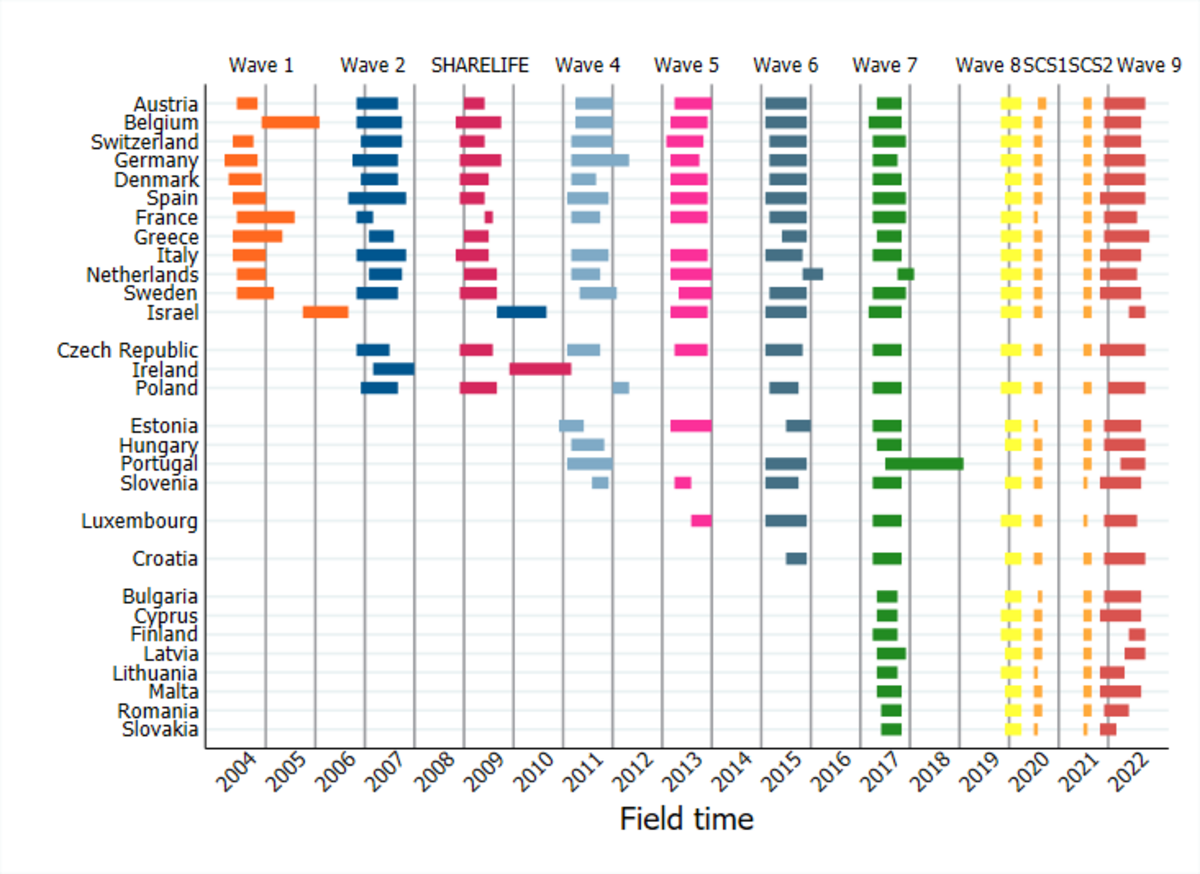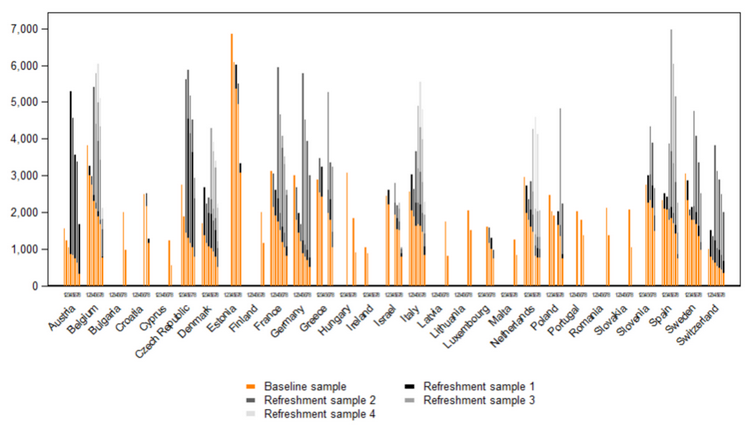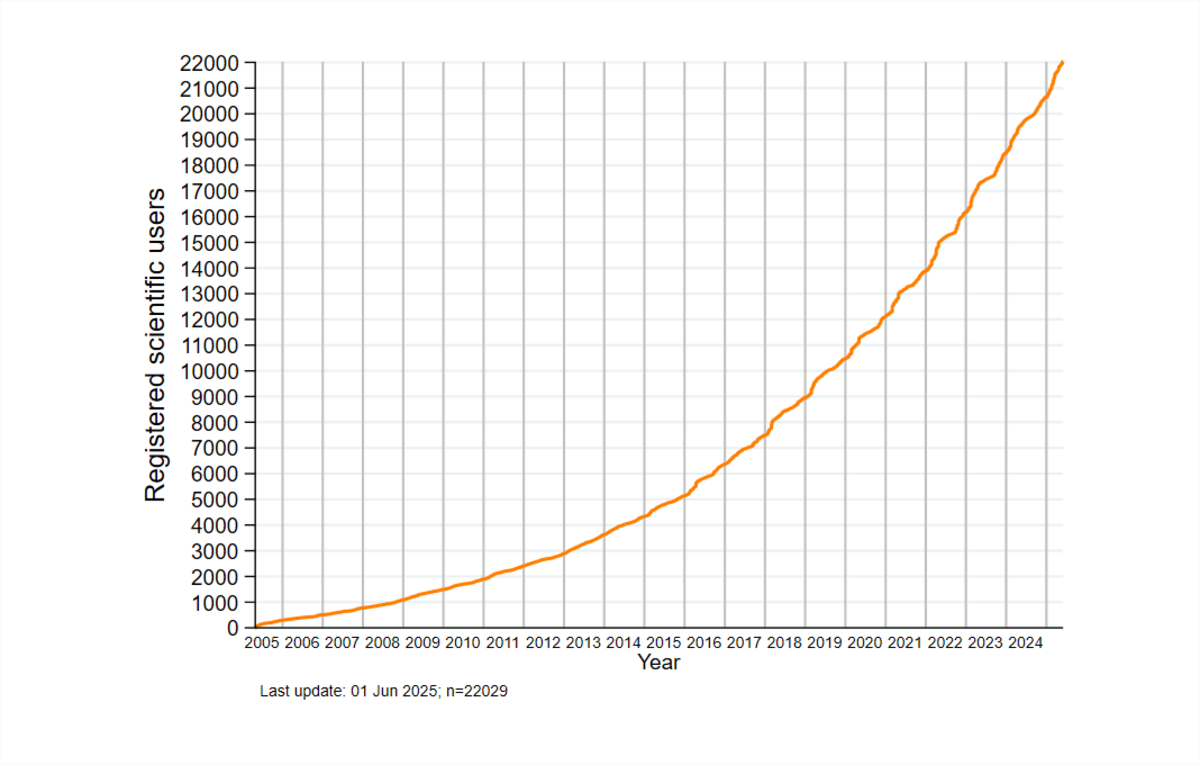News
FFQ and 24HR Nutrition Survey in 2026
Between wave 10 and wave 11, in the fall 2026, SHARE-CZ will collect detailed data on nutrition.
Both the FFQ (Food Frequency Questionnaire) and 24HR (24h Recall Questionnaire) are standard questionnaires used in other major surveys (NICOLA, ELSA, HRS and NHANES variants).
Diet is a key, modifiable determinant of healthy ageing, affecting cardiometabolic risk, frailty, sarcopenia, cognitive decline, and disability trajectories. However, robust diet-health analyses in ageing cohorts require dietary exposure measures that are (i) sufficiently detailed for nutrient- and food-group analyses, (ii) comparable across countries and survey waves, and (iii) feasible in older populations with heterogeneous digital skills and health constraints.
SHARE is uniquely positioned to address diet-related research questions in later life because it combines repeated, harmonized measures of health, function, socioeconomic status, and social networks across many European countries. Yet, diet has historically been under-measured in SHARE relative to its importance for life-course epidemiology. Implementing a Czech Nutrition Survey as a country-specific sub-project linked to SHARE Wave 11 creates high scientific value - it enables integration of dietary exposures with rich SHARE phenotyping and supports cross-country harmonization by aligning with instruments already used in other ageing studies.
Primary research aims of the Nutrition Survey:
- To quantify key dietary exposures in adults aged 50+ in the Czech SHARE sample, including foods, nutrients, and dietary patterns, and to link these exposures with SHARE’s longitudinal health, functional, and socioeconomic outcomes from a life-course perspective.
- To enhance cross-study and cross-country comparability of dietary data within ageing research by aligning nutritional outputs with established European population studies and harmonized food and nutrient constructs.
- To improve the validity and interpretability of diet-aging associations by addressing known sources of measurement error in dietary assessment.
This research project is developed in collaboration with the First Faculty of Medicine, Charles University and General University Hospital.
Dr. Tereza Vagnerova is the scientific coordinator at the Department of Geriatrics and Internal Medicine.
bioSHARE: Collection of biomarkers in SHARE
Biomarker analyses have become one of the most important innovations in micro data collections in major surveys on ageing. Biomarkers improve the measurement of health status by providing information on health conditions that are not easily observed and reported by respondents. They also help to elucidate pathways connecting social and environmental factors to broad health outcomes. Biomarkers obtained from the blood include cytokines, immune system markers, molecular and cellular markers of aging, and gene expression. Coded biomarkers will be available as restricted-access data linked to main longitudinal data for each respondent while the assays are stored in a long-term repository to take advantage of future scientific and technological developments. Biomarkers have been collected in all major longitudinal ageing surveys (HRS and ELSA since 2016).
Collection of Biomarker Data in the Czech Republic: A Synergy of SHARE-CZ and RECETOX
In order to redress this gap in Czech SHARE data, a synergy between two large research infrastructures, SHARE-CZ and RECETOX at the Masaryk University in Brno, is planned for SHARE wave 11 in 2027. In full compliance with the legislation, in the Czech Republic biological samples will be collected from all respondents through sub-contracted medical facilities and analyzed by professional laboratory staff at RECETOX. Coded data will be merged with the longitudinal SHARE-ERIC data. The collection and methodology will be compatible with HRS, ELSA, SHARE-ERIC other biological sample collections. This new database, linked also to the SHARE Harmonized Cognitive Assessment Protocol (HCAP) study, will represent a unique database not only in the SHARE-ERIC but also in European and world research.
The 11th wave of the SHARE project will take place in spring 2027
Data collection for the next, 11th wave of the SHARE project is planned for spring 2027. This wave will include the second collection of cognitive data for the HCAP (Harmonized Cognition Assessment Protocol) project, which we are preparing in collaboration with our American colleagues at the National Health Institutes. In addition, a unique collection of biomarkers will take place in the Czech Republic with the help of RECETOX laboratories at Masaryk University. We will keep you informed about further details.
The neuroSHARE Remote Study in Switzerland
The original neuroSHARE Study will be adapted to a remote version for a data collection in Switzerland in wave 11. The project will be expanded to new tests of facial motion and hearing. The cost efficiency of the neuroSHARE Study will be substantially improved by the remote, self-administered version of all tests for a smartphone (speechtest, facial motion, and hearing) and website (sleep questionnaire) version of the tests. Data for the smell test will be collected by a olfactory papers sent by mail. The application will be developed by a joint collaboration with the First Faculty of Medicine at Charles University, the Faculty of Electrical Engineering at the Czech Technical University, and the University of Lausanne, our SHARE-CH partners. The project is generously supported by the Czech-Swiss Partnership and Funds (CZ-CH Funds).
Data collection for the 10th wave of the SHARE project has been successfully completed
In September 2025, the SCaC agency completed the data collection for the 10th wave of the SHARE-ERIC project in the Czech Republic. The 10th wave included two important innovations in the SHARE project, namely the neuroSHARE project, which we prepared in collaboration with scientists from the First Faculty of Medicine of Charles University in Prague and the Faculty of Electrical Engineering of the Czech Technical University in Prague. The aim of the project is the early detection of symptoms of Parkinson’s and Alzheimer’s disease using speech, sleep, and smell tests.
Once again, we would like to thank all respondents and interviewers for their cooperation. We expect all data from the 10th wave to be available in spring 2026.
SHARE-HCAP Data Available
Data from the SHARE-HCAP (Human Cognitive Ability Protocol) project in Wave 9 are available for download to all registered users. The data contain all HCAP modules and questions. There is also a preliminary index of mild and severe cognition decline. The final release of the SHARE-HCAP data will be harmonized with HRS-HCAP data. SHARE-ERIC is currently applying for a NIA grant to collect a second wave of HCAP after wave 11. For more information please the accompanying dataset website.
Wave 10 Data Collection of the SHARE project started
The 10th wave of SHARE-ERIC data collection has begun in October and will continue till March 2025. In Wave 10 contains an innovative project neuroSHARE focusing on early detection of Parkinson and Alzheimer diseases. The neuroSHARE project is prepared in cooperation with researchers from the First Faculty of Medicine at the Charles University and the Czech Technical University. The project consists of a speech, sleep and smell tests collected immediately after the main interview. We are very thankful to all respondents and interviewers for their cooperation. More information can be found at websites of SCaC survey agency.
neuroSHARE Project in Wave 10 of the SHARE project
In the 10th wave of the SHARE project in the Czech Republic we introduce a collection of neuromarkers consisting of three tests: a test of smell, speech and a questionnaire on REM sleep quality in cooperation with the 1st Medical Faculty of Charles University and the Czech Technical University in Prague. For the first time, these tests will be fielded on a large population sample. The goal of the project is early detection of neurodegenerative diseases such as Parkinson and Alzheimer diseases as well as depression, their timely detection and treatment. We are planning even more extensive collection of objective data, so-called biomarkers in Wave 11. This project will be carried out in collaboration with the large RECETOX research infrastructure at Masaryk University in Brno.
Data from Wave 9 of the SHARE project are available for download
Data from all countries participating in the 9th wave of the SHARE-ERIC are available for download at https://share-eric.eu/data/data-access, with full documentation https://share-eric.eu/data/data-documentation and other information at https://share-eric.eu/ and http://share.cerge-ei.cz/. Data are in open access in STATA and SPSS formats, with data from national dropoff questionnaire (dropoff, module sharew9_rel9-0-0_dropoff) put together by external researchers cooperating with SHARE-CZ. Data from the HCAP questionnaire will be available in a few weeks.
Field Rehearsal for wave 10 under way in April and May
In April and May 2024 the survey agency SCaC is conducting the Field Rehearsal for wave 10. neuroSHARE, a unique project focusing on the early detection of the Parkinson and Alzheimer diseases is also tested. The neuroSHARE project is prepared in cooperation with researchers from the First Faculty of Medicine at the Charles University and the Czech Technical University. The project consists of a speech, sleep and smell tests collected immediately after the main interview.
News and innovations in the SHARE project
In the 10th wave of the SHARE project in the Czech Republic we are planning several important innovations. The Czech team in cooperation with the SCaC survey agency has successfully completed the collection of HCAP (Human Cognitive Ability Protocol) data on cognition in wave 9 and the collection of accelerometry data in wave 8. Wave 10 will focus on the collection of neuromarkers in the neuroSHARE project. It will consist of a test of smell, speech and a questionnaire on REM sleep quality in cooperation with the 1st Medical Faculty of Charles University and the Czech Technical University in Prague. We are planning even more extensive collection of objective data, so-called biomarkers in Wave 11. This project will be carried out in collaboration with the large RECETOX research infrastructure at Masaryk University in Brno.
Fieldwork in Wave 9 Data Collection of the SHARE project successfully completed
In September 2022, the survey agency SCaC successfully completed the 9th wave of SHARE-ERIC data collection. Two important innovations were a part of the 9th wave: the extensive test of cognitive abilities (the Harmonized Cognitive Assessment Protocol) and the interviewer survey. As always, external researchers placed their own questions in the dropoff questionnaire. We are again very thankful to all respondents and interviewers for their cooperation. More information can be found at websites of SCaC survey agency and here.
Wave 9 Data Collection of the SHARE project has started
The 9th wave of SHARE-ERIC data collection continues till the end of summer 2022. The interview is again supplemented by the national dropoff questionnaire and in this wave also by a test of cognitive abilities for some respondents (the Harmonized Cognitive Assessment Protocol). Besides the Czech Republic, HCAP is also collected in four other SHARE countries. The fieldwork is done by the SCaC survey agency. All interviewers have completed their vaccination against Covid-19. We are very thankful to all respondents and interviewers for their cooperation. More information can be found at websites of SCaC survey agency and here.
Data from Wave 8 of the SHARE project are available for download
Data from all countries participating in the 8th wave of the SHARE-ERIC project, including data from the special SHARE Covid-19 questionnaire, are available for download at https://share-eric.eu/data/data-access, with full documentation https://share-eric.eu/data/data-documentation, and other information at https://share-eric.eu/ and http://share.cerge-ei.cz/. Data are in open access in STATA and SPSS formats, with data from national dropoff questionnaire (dropoff, module sharew8_rel1-0-0_dropoff) put together by external researchers cooperating with SHARE-CZ. Special questionnaire Covid-CZ collected during the second wave of the pandemic in fall 2020 only in the Czech Republic is in the module sharew8_rel1-0-0_xc.
Collection of the Covid-19 CATI Survey Has Started
A second interview on the Covid-19 epidemic in all SHARE-ERIC countries has started. We would like to ask all respondents for cooperation. In the Czech Republic, it is already a third CATI interview on Covid-19. The collected data will allow researchers to compare the consequences of the epidemic over time, to understand changes in behavior and to evaluate the effectiveness of government policies. More information is on the SCAC survey agencies website.
Offer for placing research questions in the SHARE Wave 9 questionnaire in the Czech Republic
As in previous waves of the SHARE project, we offer all researchers, and especially students, the opportunity to place their own questions in the drop-off questionnaire in Wave 9 in the Czech Republic. With your help, we will be preparing the next dropoff questionnaire in May and June 2021. All information and contacts can be found here.
Interviewers’ Training for the Spring CATI Telephone Interview about Covid-19
The second special telephone interview (CATI) on Covid-19 epidemic will start in May and June 2021. The interviewers’ training has already started in March and April.
Wave 9 Scheduled for Fall 2021
The 9th wave of SHARE-ERIC will be collected in late fall 2021 and will end in spring 2022. We hope that the interview will be conducted as the usual face-to-face (CAPI) interview.
Special Wave 8 Covid-19 Data Release
Data from special CATI interviews collected in June-August 2020 are released in an open-access regime at https://share-eric.eu/. The SHARE Wave 8 COVID-19 data allow examining in-depth how the risk group of the older individuals is coping with the health-related and socioeconomic impact of COVID-19. The great advantage of these data is the possibility to measure and interpret differences in a cross-country and a longitudinal dimension. The European Commission supports our COVID-19 research project (SHARE-COVID19) with funds provided by Horizon 2020 and the Coronavirus Global Response.
Wave 9 will include Harmonized Cognitive Assessment Protocol (HCAP) study
As one of six countries of SHARE project, the Czech Republic will participate in the Harmonized Cognitive Assessment Protocol (HCAP) study in Wave 9 in 2021-22. This study consists of a supplemental in-home 1-hour battery of cognitive tests to about 500 respondents aged 65+ and a 20-minute informant interview for the identification of early onset of cognitive impairment, dementia and the Alzheimer disease. Data will be linked to the main longitudinal SHARE data and will provide an unprecedented opportunity to better understand trends in the incidence and prevalence of dementia in Europe. The HCAP has been already collected in the Health and Retirement Study (USA) and the English Longitudinal Study of Ageing.
Data collection of the 8th wave successfully completed
On Monday, December 14, 2020, the SCaC survey agency has successfully completed the second Covid19 telephone interview in the Czech Republic. We are grateful to all respondents for their participation. The data will released jointly with the main SHARE data release in 2020.
SHARE continues its Wave 8 fieldwork with a second telephone interview on Covid19.
The SHARE project in the Czech Republic will collect its second Covid19 telephone interview between October and December 2020. The questionnaire will be based on the first telephone interview from June and July. These special questionnaires will allow researchers to analyze the consequences of the first and second waves of the epidemics in the Czech Republic and Europe. The data will be important inputs into epidemiological models and we hope that in this way we will contribute to slow down the spread of the virus and minimize its negative consequences.
More information can be found at the SCaC survey agency and at www.share-project.org.
SHARE resumes Wave 8 fieldwork via telephone interviews including a special questionnaire
The data collection will start at the beginning of June in a sub-sample of all SHARE panel respondents in 27 European countries and Israel.
The data collected with this questionnaire will allow examining in depth how the risk group of the older individuals is coping with the health-related and socioeconomic impact of COVID-19. The great advantage of these data will be the possibility to measure and interpret differences in a cross-country and a longitudinal dimension. SHARE participation in a worldwide network of harmonized ageing surveys, permits European and even worldwide comparisons of how well the healthcare and social systems have responded to the pandemic and which lessons should be drawn for the future. Moreover, the use of data from previous waves allows comparing this crisis’ socioeconomic impact with previous hardships, for example the economic crisis in 2008.
Hence, the new SHARE data will enable researchers and policy makers to learn from the crisis management in other countries, linking these new data with what we already know about the life histories of our respondents and thus shed light on whether the already vulnerable have been particularly hit by the crisis, be it health-wise or economically. More information can be found at the SCaC survey agency and at www.share-project.org.
Data collection in Wave 8 temporarily stopped due to the coronavirus
Based on communication with the main coordinator of the SHARE-ERIC project, the data collection of the 8th wave of the SHARE project in the Czech Republic is temporarily stopped as of Wednesday, March 11. There is not a single case of an interviewer or a respondent having symptoms of the disease, it is only a precautionary measure due to our 50+ respondent sample. The fieldwork will be resumed when the health situation permits. We will contact and inform interviewers and respondents together with the SCaC survey agency.
We are collecting data in Wave 8
Since October 2019, data collection of the 8th wave of the SHARE project (seventh wave in the Czech Republic) has been underway. Over 100 interviewers from the SCaC agency are collecting data from around 4,000 panel respondents all across the Czech Republic. We are also recruiting new households to bring the total number of respondents to 5,000. For more information on the course of the data collection and the contact protocol, see the website of the SCaC agency. We are really grateful to all respondents for cooperation and support of the project.
Data from the 7th wave of the SHARE project (release 7.0.0) for download
Data from the 7th wave of data collection are available for download from the data server of the SHARE project at www.share-project.org. The data are in the STATA and SPSS format, also compatible with the R statistical software (free). Access to the data is on the main SHARE portal, where all the information on registration and data download can be found. The main portal also contains complete documentation, which is also available on the Czech website.
Field Rehearsal for 8th wave of data collection is underway
In April and May 2019, we started the final field rehearsal of data collection and of the questionnaire and the CAPI computer system for the next wave of SHARE data collection in the Czech Republic. We hereby thank all the respondents for their participation and help. The 8th wave of data collection itself is planned for autumn 2019.
Offer for the inclusion of questions in the paper-and-pencil questionnaire in the 8th wave of SHARE data collection
Like in all data collection waves, researchers at Czech academic and scientific workplaces are offered the opportunity to include their own questions in the paper-and-pencil SHARE questionnaire. The so-called dropoff is a national questionnaire answered by respondents after their completion of the main questionnaire. The questions in the dropoff should be aimed at topics important for the Czech Republic that are not covered by the international questionnaire. We are happy to provide this service to Czech researchers free of charge and hope that the offer will lead to the analysis of new topics and formulation of data-based domestic policies. Those interested will find more information here.
Testing of data collection for 8th wave of the SHARE project is underway
In July and August 2018, thorough testing is being conducted of the questionnaire and the CAPI computer system for another wave of SHARE data collection in the Czech Republic. We hereby thank all the respondents for their participation and help. The second, final test will take place in June. The 8th wave of data collection itself is planned for January through June 2019.
Data SHARE and easySHARE (release 6.1.1) for download
The new easySHARE data release for incipient researchers and students is available on the SHARE data portal in a format for the programs STATA, SPSS, and R (free). To use the data, users must register (more information here).
Data collection of the 7th wave of the SHARE project in the Czech Republic has ended
In October 2017, data collection of the 7th wave of the SHARE project (6th wave in the Czech Republic) came to an end. We thank all the respondents and interviewers for help and cooperation. Data from the 7th wave will be available for download in early 2019.
IDEA for the 2017 election in cooperation with the SHARE-CZ project: Analysis of the incomes of the elderly
Thanks to a new grant of the SHARE-CZ project, long-term cooperation is starting between the IDEA think-tank at CERGE UK and the scientific team of the SHARE project. The first result is the analysis of the incomes of the elderly by Filip Pertold and on the website of the IDEA project.
Data collection of the 7th wave of the SHARE project currently underway
Since March 2017, data collection of the 7th wave of the SHARE project (6th wave in the Czech Republic) has been underway. Over 100 interviewers from the SCaC agency are collecting data from more than 4,500 respondents all across the Czech Republic. The interviewers are contacting respondents who participated in the data collection in the previous waves. For more information on the course of the data collection and the contact protocol, see the website of the SCaC agency. We thank all the respondents for cooperation and support of the project. The data collection will continue until September 2017.
Data from the 6th wave of the SHARE project (release 6.0.0) for download
Data from the 6th wave of data collection are available for download from the data server of the SHARE project. The data are in the STATA and SPSS format, also compatible with the R statistical software (free). Access to the data is on the main SHARE portal, where all the information on registration and data download can be found. The main portal also contains complete documentation, which is also available on the Czech website.
Data SHARE and easySHARE (release 6.0.0) for download
The new easySHARE data release for incipient researchers and students is available on the SHARE data portal in a format for the programs STATA, SPSS, and R (free). To use the data, users must register (more information here).
Offer for the inclusion of questions in the paper-and-pencil questionnaire in the 7th wave of SHARE data collection
Like in all data collection waves, researchers at Czech academic and scientific workplaces are offered the opportunity to include their own questions in the paper-and-pencil SHARE questionnaire. The so-called dropoff is a national questionnaire answered by respondents after their completion of the main questionnaire. The questions in the dropoff should be aimed at topics important for the Czech Republic that are not covered by the international questionnaire. We are happy to provide this service to Czech researchers free of charge and hope that the offer will lead to the analysis of new topics and formulation of data-based domestic policies. Those interested will find more information here.
Testing of data collection for another wave of the SHARE project is underway
In February, thorough testing is being conducted of the questionnaire and the CAPI computer system for another wave of SHARE data collection in the Czech Republic. We hereby thank all the respondents for their participation and help. The second, final test will take place in June. The 7th wave of data collection itself is planned for January through June 2017.
Preparations made for the 7th wave of data collection of the SHARE project aimed at life history
The 7th wave of the collection of panel dates (sixth in the Czech Republic) will take place in January through June 2017 on a sample of our existing panel respondents. This wave will be aimed at life history – i.e. information on important events in the lives of individuals in their childhood, adolescence and adulthood, which will make it possible to monitor their later impacts in old age, especially on health, quality of life and socio-economic situation. Because a survey of life history already took place in the third wave in 2008, the respondents who already answered these questions will complete the usual questionnaire. We again expect the participation of external researches in formulating questions for the national paper-and-pencil questionnaire.
Subsections of SHARE Data
Data access
Access to SHARE Data
SHARE data are openly accessible for scientific research purposes.
The SHARE data are distributed by the international scientific consortium SHARE-ERIC (Survey of Health, Ageing and Retirement in Europe – European Research Infrastructure Consortium) to registered users via the SHARE Research Data Center.
Data access is free of charge and adheres to the legislation of the European Union and national data protection laws. Use is governed by publicly available rules.
The data are hosted in cooperation with the following archives:
- CentERdata Archive (Tilburg University, Netherlands)
- GESIS Data Archive (Leibniz Institute for the Social Sciences, Cologne, Germany)
Data Files
A complete overview of available data files for all SHARE survey waves, including supplementary data, can be found here:
🔗 SHARE Data Releases
Registration Process
Because the official SHARE-ERIC website is frequently updated, always follow the instructions provided at:
🔗 www.share-eric.eu
Access to SHARE data is free. Registration is required only once – your login credentials remain valid for future data releases.
Summary of Steps:
- All SHARE data are freely accessible at: https://releases.sharedataportal.eu
- Data are hosted at CentERdata and GESIS archives.
- You can download data after completing registration (see below).
- Data are available in STATA and SPSS formats (also usable in R).
- Data documentation is available at the SHARE data portal.
- FAQs are available here
Data from all waves and all special questionnaires (HCAP, COVID-19, accelerometry, life history, national questionnaires and projects) are available for download.
Note: The Czech Republic joined SHARE in Wave 2.
Steps to Register
Step 1: Read the terms of use:
🔗 SHARE Conditions of Use
Step 2: Download and complete this form:
📄 SHARE User Statement (PDF)
Step 3: Submit a pdf scan of the completed and signed form by email to:
📧 E-mail: share-rdc@centerdata.nl
Step 4: If you need any help, please email us at
📧 E-mail: share@cerge-ei.cz
Downloading Data After Registration
Once your registration is processed (usually within a few days), you will receive:
- a personal user ID (login) and an initial password (valid for 72 hours)
Login: https://releases.sharedataportal.eu/users/login
If you forget your credentials or want to reset them, visit:
🔗 SHARE RDC Login Page
SHARE Data Usage Conditions
Please read the official data usage policy:
📄 SHARE Conditions of Use
Citation Requirements and Acknowledgment
According to the
SHARE Citation requirements, every publication using SHARE data must include:
- a proper acknowledgment of the SHARE project
- a reference to the data used
The citation requirements change with each data release, please always use the current citation wording from the official webiste 🔗 https://share-eric.eu/
Main panel
Questionnaire overview
The SHARE main questionnaire consists of around twenty modules. All data are collected by face-to-face, computer-aided personal interviews (CAPI), supplemented by a self-completion paper and pencil questionnaire. Not all respondents have to answer all modules of the questionnaire. The questionnaire modules that rather refer to the household than to the individual are only answered by a designated financial, family, or housing respondent.
The SHARE Questionnaire is the instrument to get valid data. SHARE follows the ex-ante harmonization approach for the design of the questionnaire. It is developed starting from the English version, translated in 39 country-specific languages and adapted to the national institutional framework. The questionnaire consists of a set of core modules and wave specific add-ons.
At the SHARE data portal you can find the generic and language versions of all questionnaires.
Data documentation is cumulatively available in the official Release Guide after each wave and each data release.
SHARE Methodology Volumes
contain detailed information on single survey waves and corresponding methodological background.
Cross Wave Comparison
For questionnaire correspondence across waves the basic rule holds that questions are identically named if the content has not changed.
As changes sometimes have to be conducted due to societal changes (eg. new communication tools) or due to flaws found in the previous waves (e.g. ambiguous understanding of question wording) you will find an overview of the generic versions of the questionnaires in all waves where you can track the deviations between waves.
In order to compare the items across different waves easier, we provide the following two documents:
- the comparison of question texts, response options and interviewer instructions in the main questionnaires of the regular SHARE items
- the comparison of question texts, response options and interviewer instructions in the main questionnaires of the SHARELIFE items of Wave 3 and Wave 7
For a wave N, questions are coded in the following way:
| WN_Question_Text |
Question texts |
| WN_Response_Options |
Response options |
| WN_Interviewer_Instruction |
Interviewer instructions |
| . |
Question has not been asked at all in corresponding wave |
| [none] |
Question has been asked in corresponding wave but no interviewer instruction, response option or in some cases question text (e.g. interviewer observation) was given |
Modules
The following table presents the structure of Questionnaire Modules from wave 1 to wave 9.
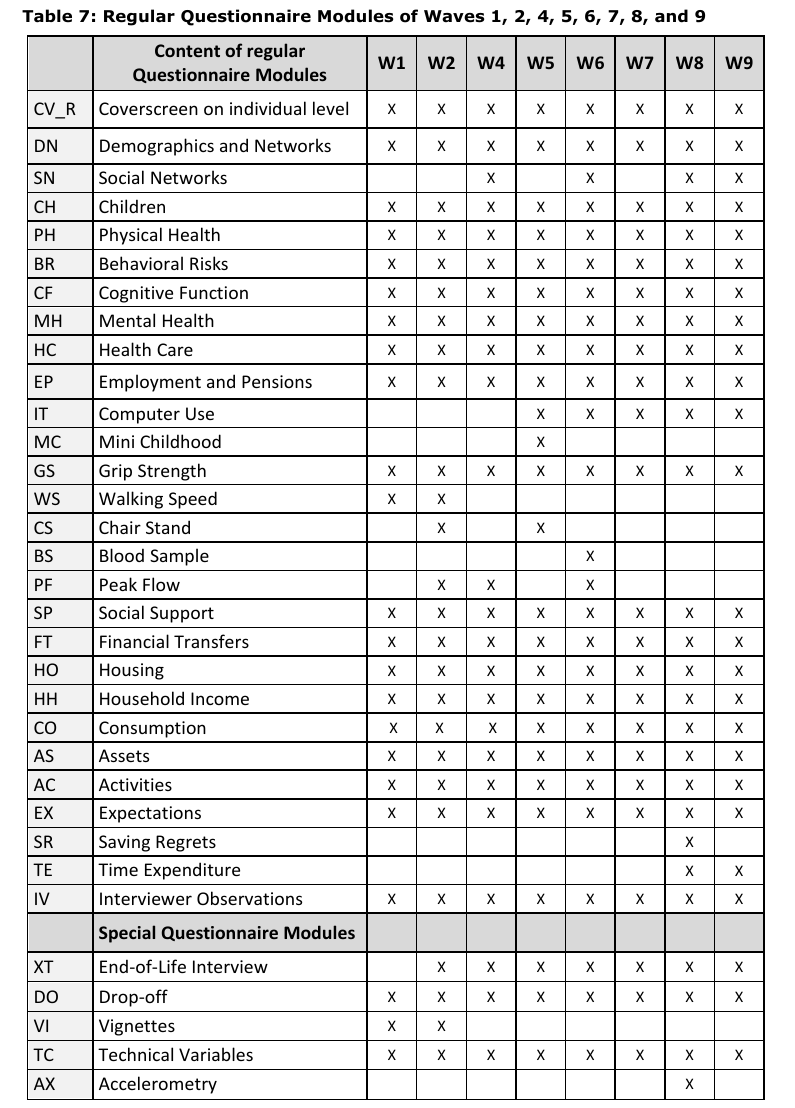

Generated variables
SHARE-ERIC team codes important variables according to their international indexes and standardized variables. These modules are part of each Release. The most important generated variables module is gv_health
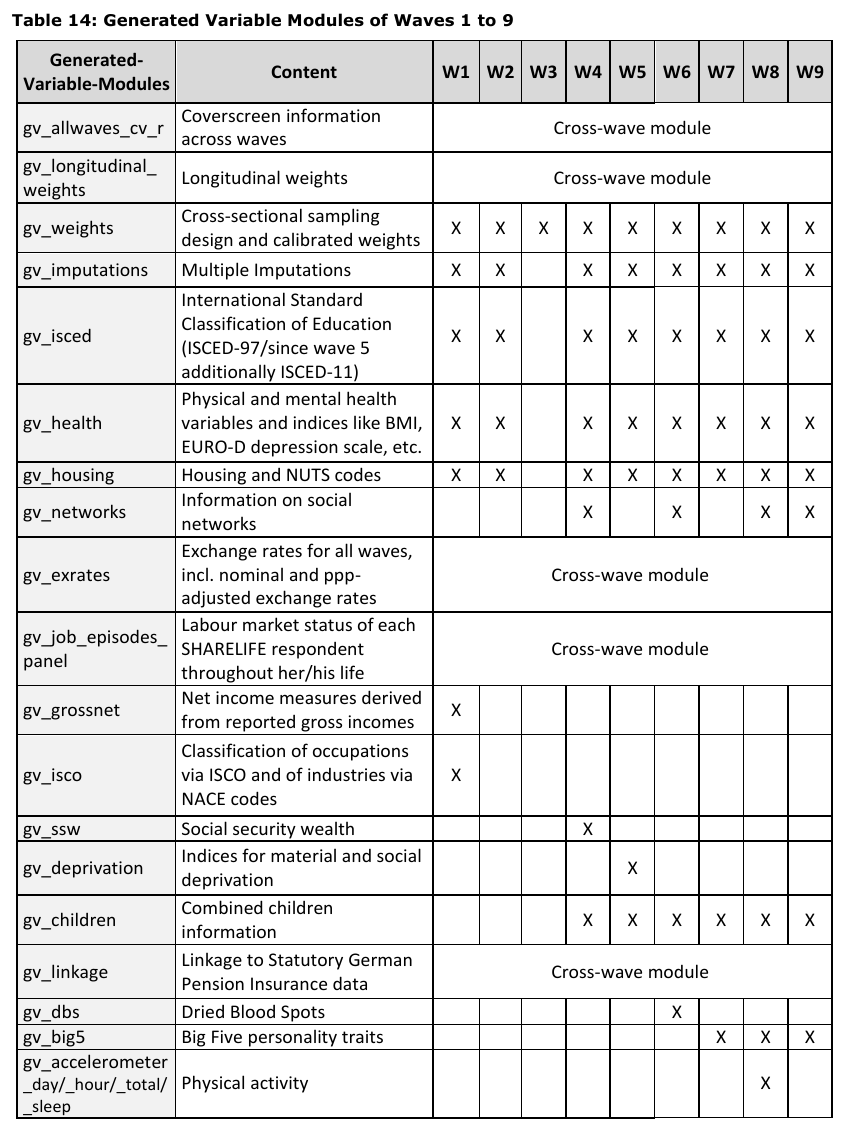

Respondent types
Each household consists of the main sampled respondent aged 50+ and his or her partner (who might be younger). Some modules must be answered by each respondent while depending on questionnaire and module content, questions can be answered only by a family, household or financial respondent. Some modules can be answered by a proxy respondent on behalf of a respondent who is unable to answer the questions.
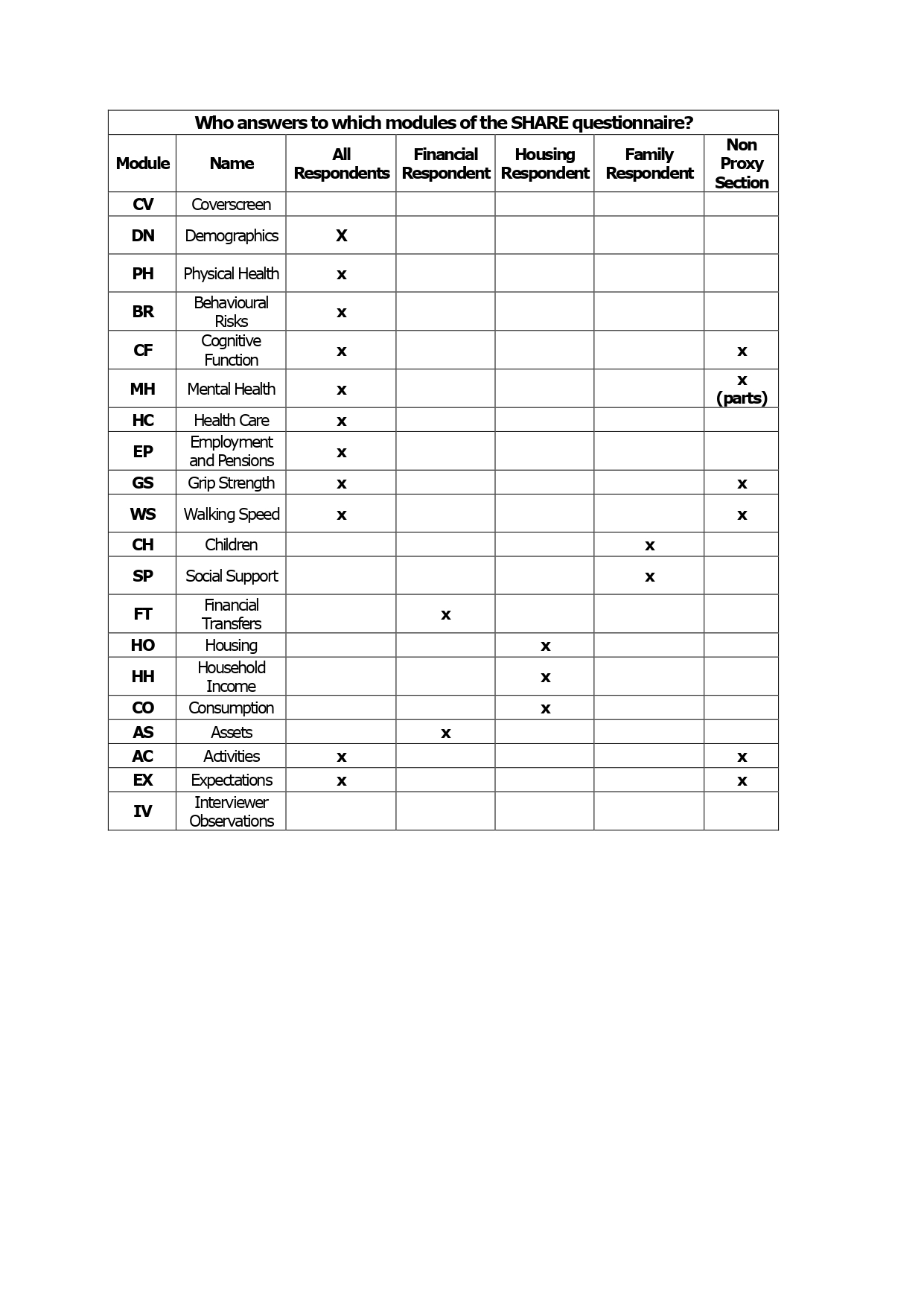

SHARELIFE Life History
SHARELIFE data was collected in wave 3 and wave 7 focusing on respondents’ life histories. Most of the information collected in the regular SHARE waves is about the current life circumstances. As a result, we know little about what happened earlier in the respondents’ lives. SHARELIFE gathers more detailed information on important areas of our respondents’ lives, ranging from partners and children over housing and employment history to detailed questions on health and health care. SHARELIFE data complements the SHARE panel data by providing life history information to enhance our understanding of how early life experiences and events throughout life influence the circumstances of older people. With this variety SHARELIFE constitutes a unique cross-national, interdisciplinary database for research in the fields of sociology, economics, gerontology, and demography.
Collecting accurate retrospective information is a challenge. Respondents may not remember the occurrence or the exact timing of past events perfectly. Therefore, SHARELIFE follows a Life History Calendar (LHC) approach, which has been designed to help respondents in remembering past events more accurately. Using this method, the life events of interest are displayed on a “calendar”, enabling interviewers and respondents to cross-reference certain life-events with others (e.g. “I moved from A to B the year after my first child was born”). Using the life history calendar technique has been shown to improve the accuracy of the retrospective information given by respondents.
Life History Calendar
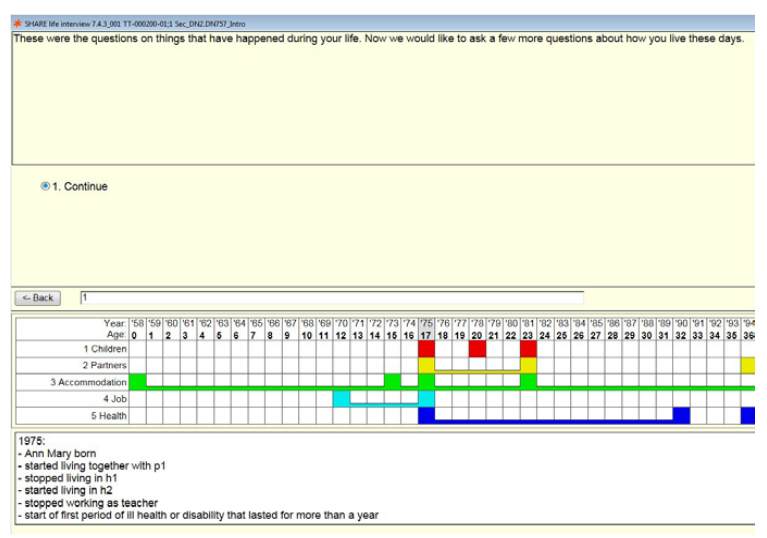

The questioning method used in the SHARELIFE project is based on what is known as a Life History Calendar. The respondent’s life is graphically represented by a grid, which is automatically filled in during the interview.
The idea behind the LHC is to help the respondent remember by first asking about life events that they are likely to remember accurately. The interview usually begins with the names and dates of birth of the respondent’s children (and other information about them), followed by the history of their partners.
Once an event appears in the LHC, the interviewer can refer to it as an aid. For example, if the respondent is unsure of the date of a job change, it may be helpful to ask, “Was it before or after the birth of your second child?”
This principle applies to all other modules and is also flexible: respondents do not have to start with the module on children. If it is easier for them to remember another part of their life, they can start there.
Another aid provided by the LHC is a list of significant events for each year. If the respondent is unsure of the date, the interviewer can help by mentioning or verifying one of these events. For example, if the respondent cannot remember the year their child was born but knows that it was the same year as the occupation of Czechoslovakia in 1968, this information can help the interviewer determine the date.
In Wave 7, the SHARELIFE interview was administered to respondents for whom information on their life histories was still missing. This interview concerned all respondents from countries that joined SHARE after Wave 3 and respondents from “old countries” who were not interviewed in Wave 3, namely, new spouses and respondents from so-called refreshment samples. In total, SHARELIFE data from over 60,000 respondents from 27 countries were collected. This massive data source will be useful for researchers around the world. Respondents whose life histories were already collected in Wave 3 were asked the regular SHARE panel questionnaire (approximately 13,000 respondents).
SHARELIFE – life history calendar modules
The SHARELIFE history calendar records events into a grid, which spans across the respondent’s life course in years, time being the horizontal dimension. Table 2.1 is a tabular itemisation of the SHARE Wave 7 life history calendar, which displays different dimenions of a respondent’s life history:
- Information about the respondent’s offspring
- Information about partners
- Accommodation history
- Employment history
- Health history
Life History Calendar Modules
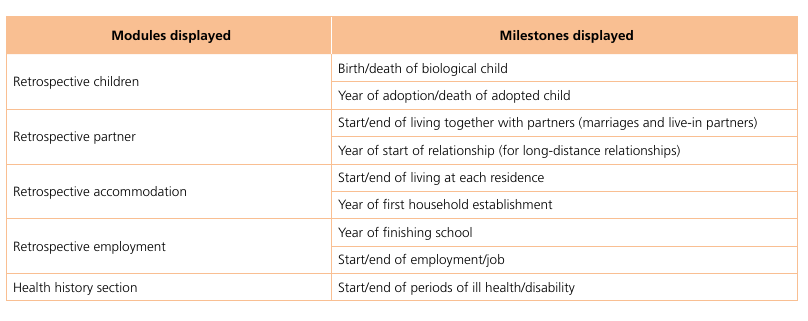

The SHARELIFE interview in Wave 7 spanned various salient domains of a respondent’s life course:
-
The retrospective children questions collected retrospective information on children and deceased children, including information about pregnancies, births, adoptions, characteristics of children and maternity benefits and leave. The information obtained in these areas was contextualised by accompanying follow-up questions about employment and income at the instance of occurrence of certain salient events. For example, there were questions on income sources at the time of motherhood.
-
The retrospective partner questions collected retrospective information on all relationships until the present, including information on living arrangements, cohabitation, marriages, separation, divorces, and death of partners.
-
The retrospective accommodation questions collected information on past and current accommodations, including details of household establishment, residences (country, region), special accommodation events, moves, types of accommodation, cohabitation with parents/children, and ownership.
-
The retrospective employment questions collected data on employment spells, including information about employment status, job characteristics, income, retirement benefits, and employment after retirement. Data are also collected on work quality, job satisfaction, and career breaks due to ill health or disability, disability allowances, insurance and computer skills.
-
The retrospective health questions elicit information about health and healthcare history during both childhood and adulthood, including details about hospital stays, illnesses, injuries, diseases, vaccinations, doctor visits, preventive check-ups, health behaviours, reasons for not going to the doctor, forgone medication, and impact of financial situation on health care.
Information was also collected on childhood circumstances (e.g., childhood health, academic performance, relationship with parents, features of accommodation, books read, companions).
With respect to finances (e.g., insurance, housing, investments), information was collected on financial investments that the respondent may have made during his/her life, including investments in stocks or shares, mutual funds or managed investment accounts, life insurance uptake, business ownership, and overall household income (amount).
Information was also collected on general life events (e.g., periods of hunger, periods of happiness, stress, financial hardship, discrimination at work, respondent and parental experiences of persecution, oppression, and dispossession).
National module
National Module
The SHARE project is fully harmonized with similar studies in the U.S. (HRS), the UK (ELSA), and new initiatives in China, Japan, India, and other countries. As part of the main questionnaire, each country also includes a National Module (originally a self-completion questionnaire, the so-called drop-off), which allows countries to include their own questions. These do not have to be harmonized with other countries and offer a unique opportunity to address locally relevant issues or carry out field experiments that may not be meaningful in other contexts.
Thanks to the support of the Ministry of Education, Youth and Sports of the Czech Republic and in cooperation with the Research Institute for Labor and Social Affairs (RILSA), we included the National Module in waves 2, 4, 5, 6, 7, 8, and 9. In all of these collections, we provided external researchers with space in the questionnaire for their questions. For beginning and junior researchers, this is a unique opportunity to collect data on their own topic from a representative sample and, in addition, to combine this data with the main SHARE data, including life history data and other special data collections.
In wave 10, the National Module was used for questions related to the neuroSHARE project.
Invitation to Submit Your Questions for the National Module (in wave 9)
We invite you to participate in the upcoming 9th wave of the SHARE project. The drop-off questionnaire is completed by respondents (or their proxies) after finishing the main CAPI interview. Due to space limitations, questions must be clearly worded, easy to understand (especially considering the age of the respondents), and should not deter participation. Importantly, they must not duplicate questions from the main questionnaire.
Responses must be either numeric or selected from predefined categories—open-ended questions are not allowed. The drop-off will be pretested in autumn 2021 during the main questionnaire pilot. We will analyze responses from the test, remove problematic or non-informative questions, and prepare the final version of the drop-off, which must be approved by the project coordinator.
Data collected from the drop-off will be linked to the main longitudinal SHARE dataset, allowing researchers to relate responses to the respondents’ life histories and other data.
If you are interested in including your own questions in the SHARE drop-off, please contact us at the email addresses below. Before submitting your proposal, we encourage you to review questionnaires from previous waves (note that not all questions were successful) to avoid duplication. You can find these questionnaires—including coverscreen, main interviews, exit interviews, and previous drop-offs—at http://share.cerge-ei.cz.
To formulate your questions appropriately, we recommend registering for access to the SHARE dataset at https://share-eric.eu/, downloading the data free of charge, and exploring what variables which are already available. The website also contains full project documentation, including publications, methodological materials, and detailed codebooks.
We anticipate high interest, and each contributor will likely be allocated space for a small number of questions (i.e. a topic-specific module). Questions from all fields—sociology, psychology and economics are welcome. We particularly encourage contributions that address important issues in the Czech Republic, with potential for use in academic publications, dissertations, teaching, or evidence-based policymaking.
We are especially interested in questions that are comparable with other international studies. In addition to the usual longitudinal focus, the upcoming wave will also examine cognitive abilities and — in several countries including the Czech Republic — use accelerometers to measure participants’ physical activity.
This opportunity, like data access, is provided free of charge as part of the Czech SHARE infrastructure funded by the Czech government and Ministry of Education, Youth and Sports. Please note that questions must not be related to or funded by commercial entities. Violating this rule would not only be unethical, but could also jeopardize the SHARE project as a whole.
While the primary selection criteria are quality and originality, this call is especially intended to support early-career researchers and students who may not otherwise have the opportunity to collect their own data.
Before each new wave, we contact all users and organize a workshop for those interested in submitting questions to the drop-off. If you’re interested, please send us your proposed topic, draft questions, and a short description or justification of your research idea. During the workshop, we will discuss all submissions and refine selected proposals into a working version to be submitted for approval and pilot testing.
If you know of a colleague who might be interested in participating, feel free to forward this call to them. We especially encourage forwarding this opportunity to your students.
We look forward to your participation and future collaboration.
Radim Boháček
SHARE National Coordinator – Czech Republic
CERGE-EI
Politických vězňů 7
Prague 1, 111 21
Phone: +420 775 379 336
Email: radim.bohacek@cerge-ei.cz or radim.bohacek@gmail.com
Project websites: https://share-eric.eu/ and http://share.cerge-ei.cz
You can find questionnaires and codebooks from previous waves here.
HCAP cognition data
Harmonized Cognitive Assessment Protocol
The general aim of SHARE-HCAP is to exploit the international variation of health and life circumstances in Continental Europe to identify which interactions of bio-medical and socio-economic conditions over the life course affect cognition in later life. The understanding of such life-course pathways to first mild cognitive impairment and then, possibly, dementia, should help in developing preventive early interventions.
The project will enhance our understanding how the vastly differing social, health and long-term care systems affect mental health and resulting mortality of the aging populations. This holds especially for the life circumstances in Europe since World War II which are likely to have influenced cognitive decline now at older ages. Moreover, the large variation in key policy variables, e.g. retirement age, identifies pathways from early retirement through inactivity and loss of social contacts to lower cognition, mediated by education, working environment and other socio-economic factors over the life-course.
Questionnaires
The HCAP project in the Czech Republic was administered according to the HCAP licences and questionnaires for
respondents
and
informers.
These questionnaires were translated from their English originals
respondents
and
informers.
SHARE-HCAP Data Available
Data from the SHARE-HCAP (Human Cognitive Ability Protocol) project in Wave 9 are available for download to all registered users. The data contain all HCAP modules and questions. There is also a preliminary index of mild and severe cognition decline. The final release of the SHARE-HCAP data will be harmonized with HRS-HCAP data. For more information please the accompanying dataset website.
HCAP data are available for download in the SHARE data archive.
HCAP2
SHARE-ERIC is currently proposing a longitudinal collection of HCAP2 after wave 11 on the same respondents plus an additional sample of new respondents.
Methodology
The project administers in-depth measurement of cognition according to the Harmonized Cognitive Assessment Protocol (HCAP) that has been developed for the HRS-style aging surveys supported by NIA.
HCAP consists of a recently developed battery of in-depth cognition measures. More specifically, it consists of about one hour of subject cognitive testing and a twenty-minute informant interview, both of which can be administered in the home or care facilities by survey interviewers with advanced training.
Using these data, the project will estimate prevalence rates of mild and severe cognitive impairment in the SHARE countries; compare these with HRS and other participants in the HCAP studies; and exploit the international variation of the SHARE plus SHARE-HCAP data in order to identify which interactions of biomedical and socioeconomic conditions over the life course affect cognition later in life.
The measures included in HCAP were selected by three criteria: (a) can be administered in the home by a survey interviewer in about one hour, (b) can be administered comparably and lead to comparably valid assessments in other countries where HRS-type surveys are conducted, and (c) has sufficient overlap with the 2002/03 HRS-ADAMS study that it can be used to establish trends in the prevalence of cognitive impairment in the US. Using these data, the project will estimate prevalence rates of mild and severe cognitive impairment in the SHARE countries; compare these with HRS and other participants in the HCAP studies; and exploit the international variation of the SHARE plus SHARE-HCAP data in order to identify which interactions of biomedical and socioeconomic conditions over the life course affect cognition later in life.
Countries: The project will be implemented in five SHARE countries (Denmark, Czech Republic, Germany, France, Italy) in a stratified study sample of 2,500 SHARE panel respondents. The start of the fieldwork is planned by early 2022. Versions of HCAP will also be conducted in the US, Mexico, India, China, and South Africa.
For more information on the HCAP Network visit: https://hrs.isr.umich.edu/data-products/hcap
geoSHARE
We are currently processing geographical information from all SHARE respondents, including life history data, at NUTS2 and NUTS3 levels. The data will be available with restricted access in order to comply with GDPR privacy rules.
geoSHARE data
In collaboration with our Italian colleagues from Ca’ Foscari University in Venice, we have processed all data on the locations of respondents during interviews in each wave of SHARE data collection.
We have combined this data with information about their life events from the DN questionnaire and information about their parents, children, and family.
The result will be a detailed history of the respondent’s geographical location from birth to the last interview in the SHARE study.
The publication of the data itself must undergo a legal review to ensure that all conditions for personal data protection and GDPR rules are met. SHARE-ERIC is responsible for this. We expect the data to be published at various levels of open access in 2026.
Methodology and documentation:
You can download the results of our work as a working document.
Location of respondents in individual waves Working document
Geographic data: location of respondents in life history Working document
Geographic maps:
Location of respondents in life history
NUTS3 classification
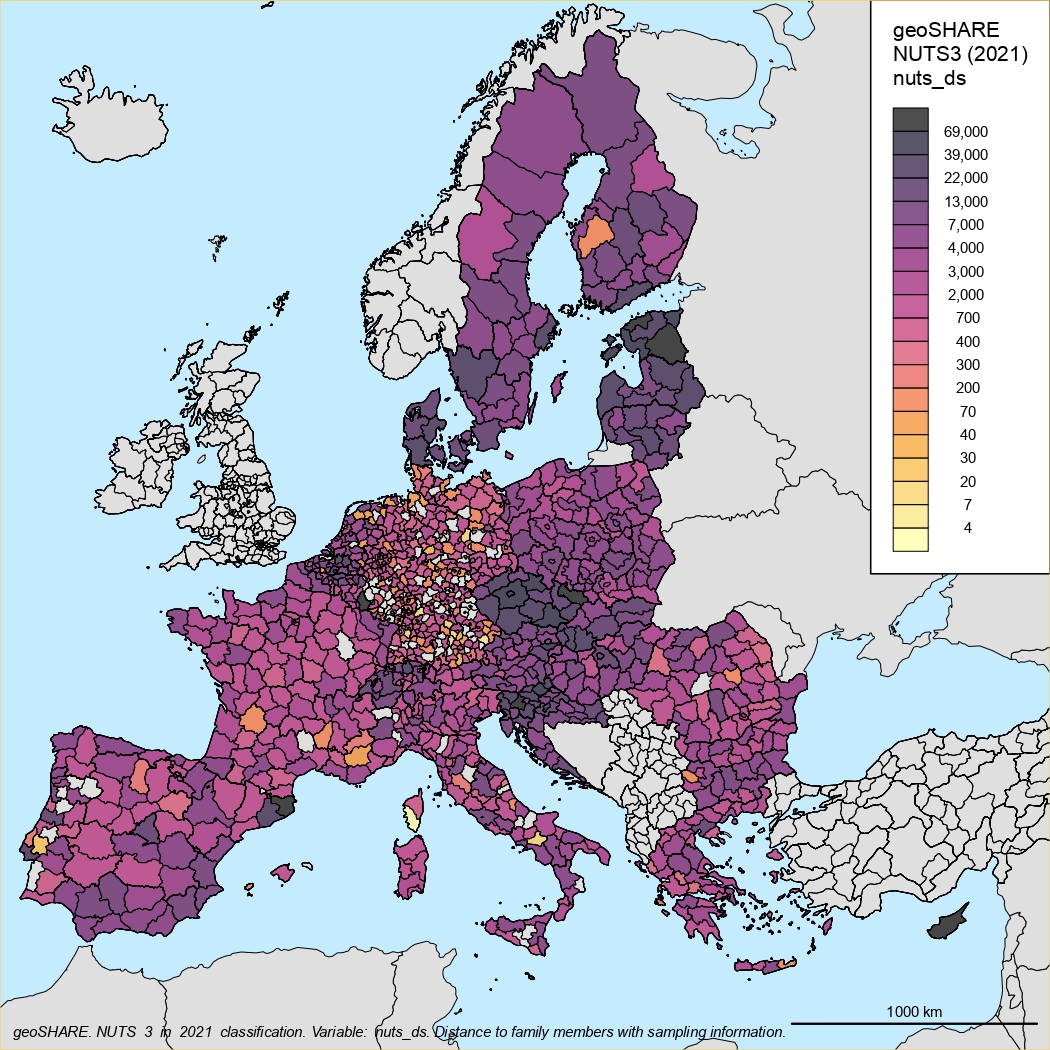

NUTS2 classification
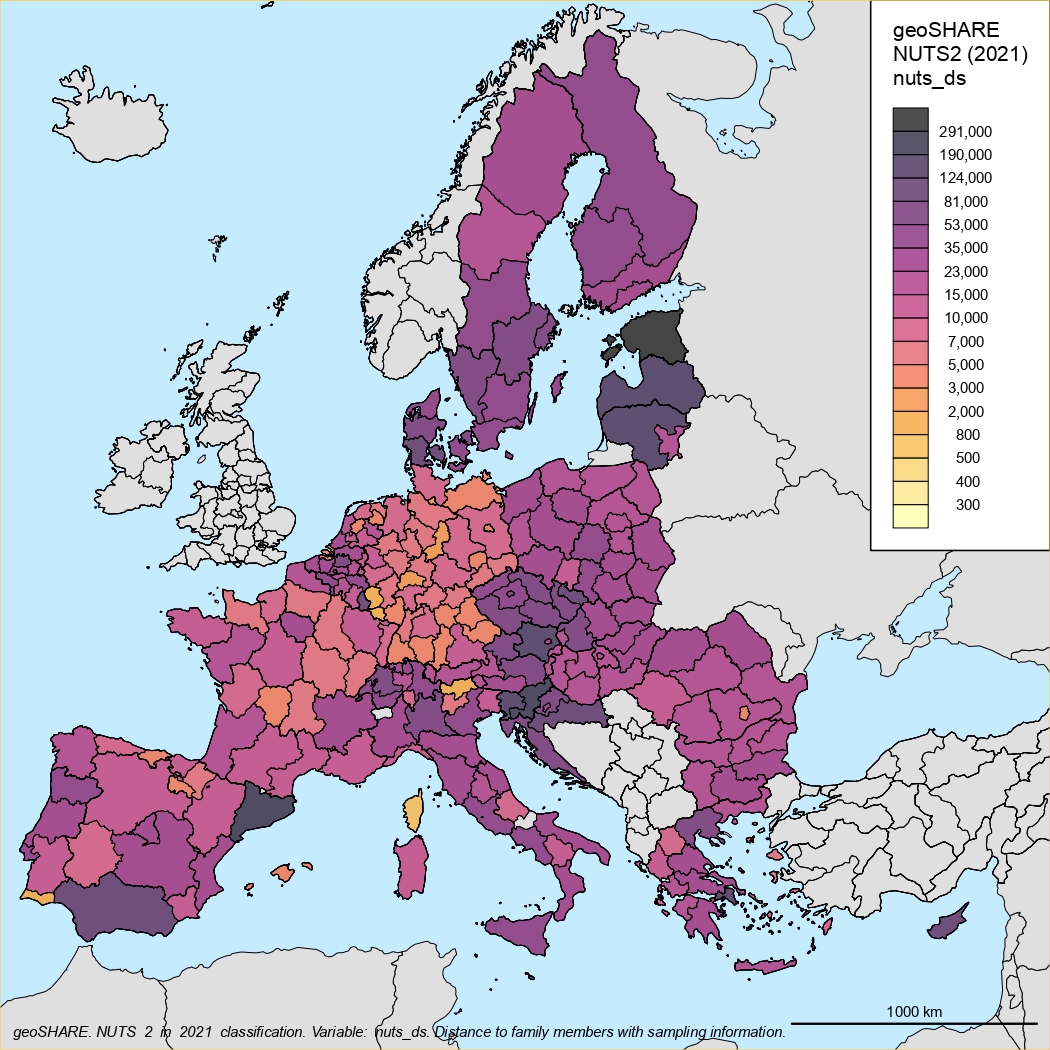

NUTS1 classification
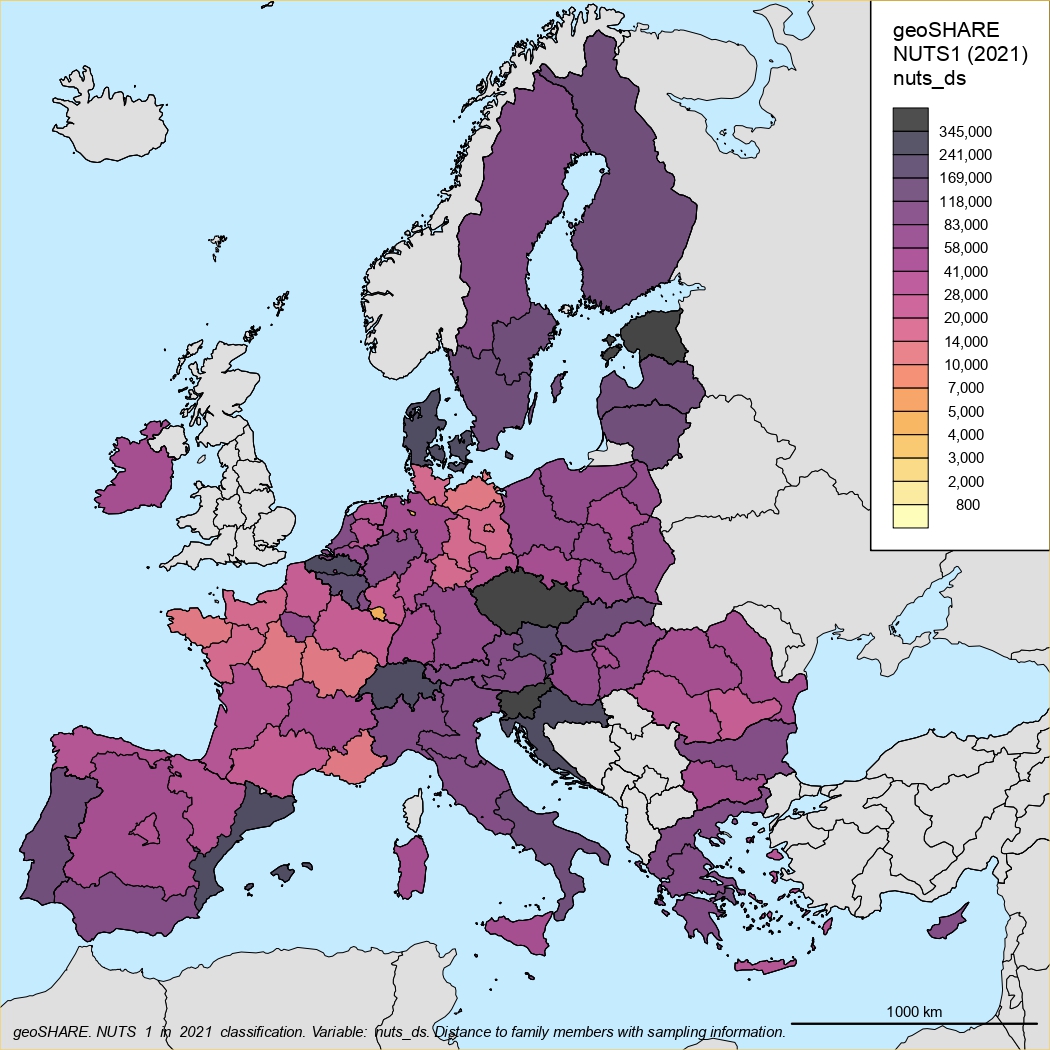

NUTS0 classification
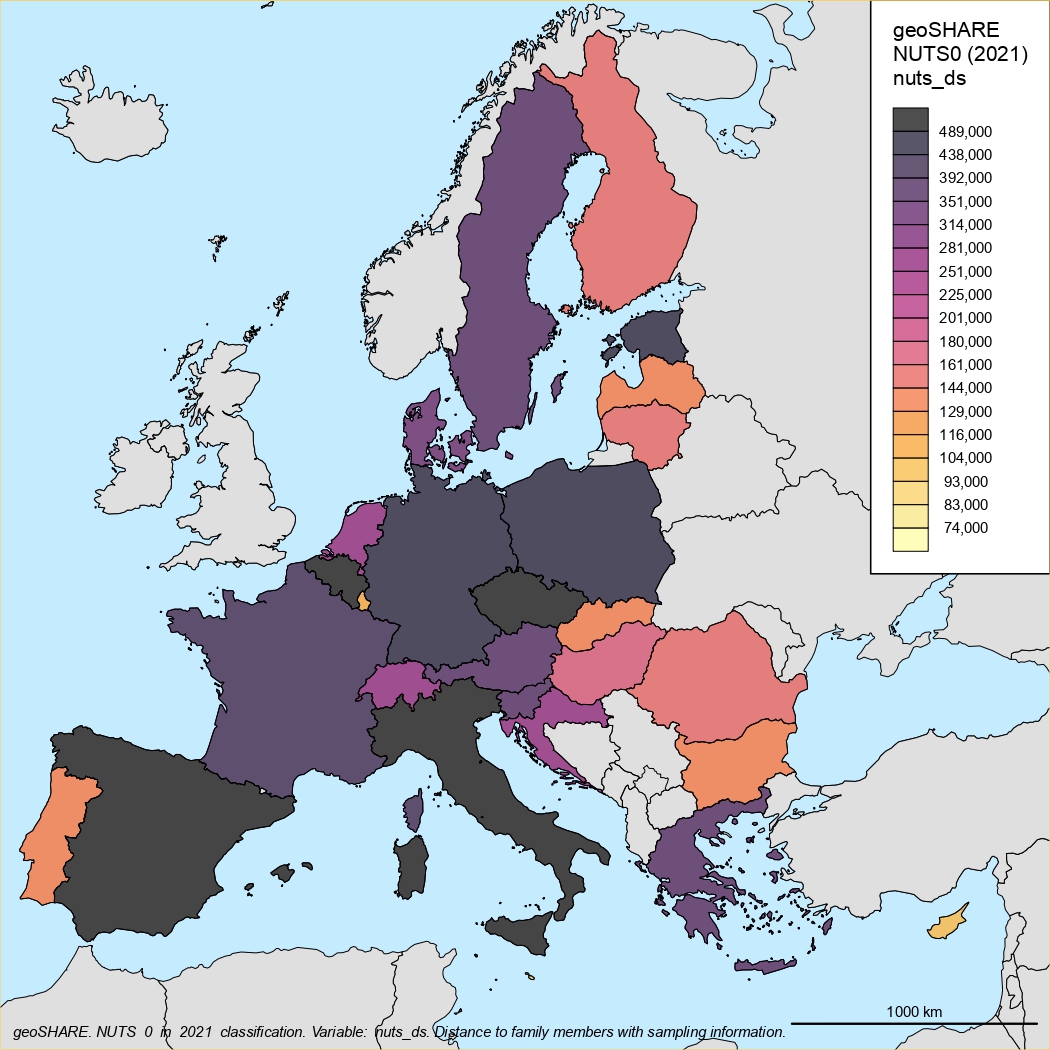

Location of respondents during data collection in individual SHARE waves
NUTS3 classification
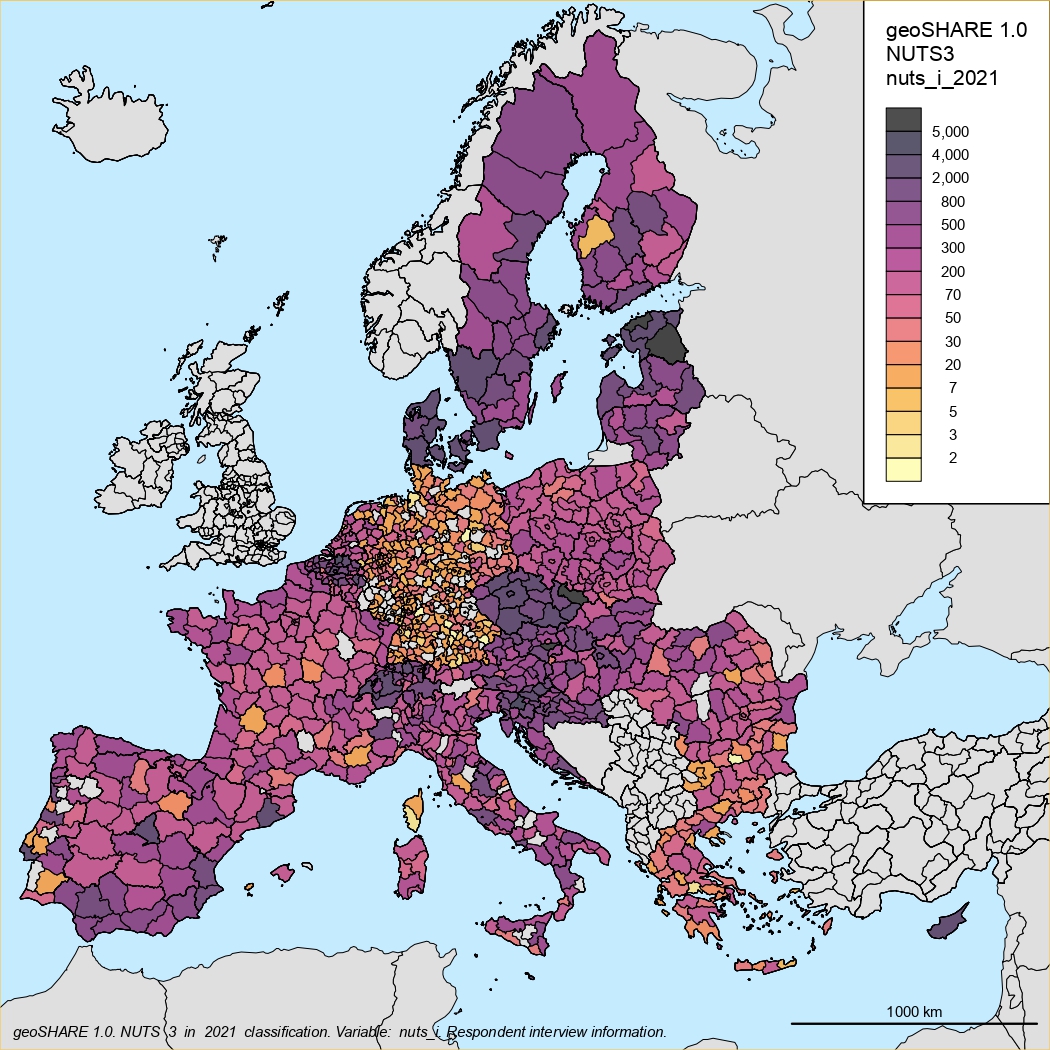

NUTS2 classification
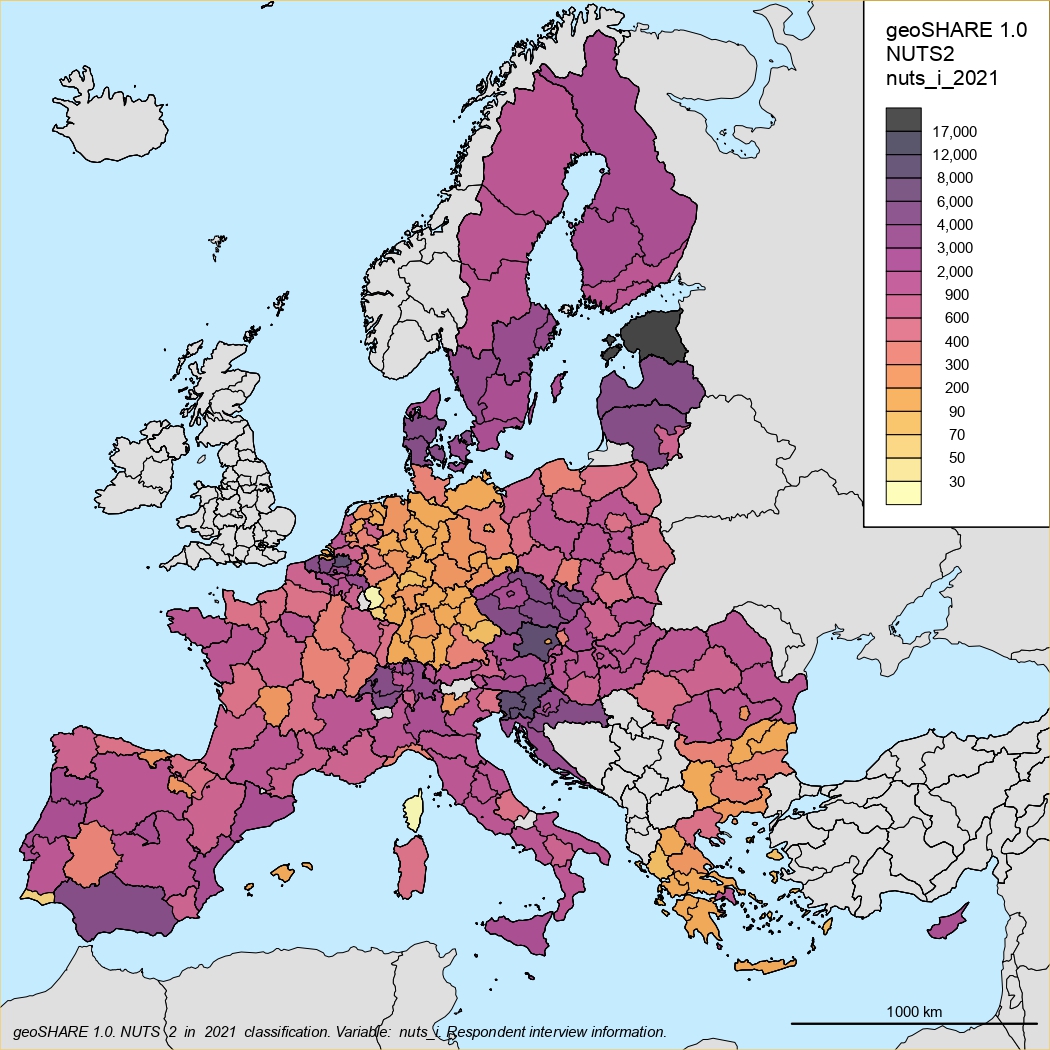

NUTS1 classification
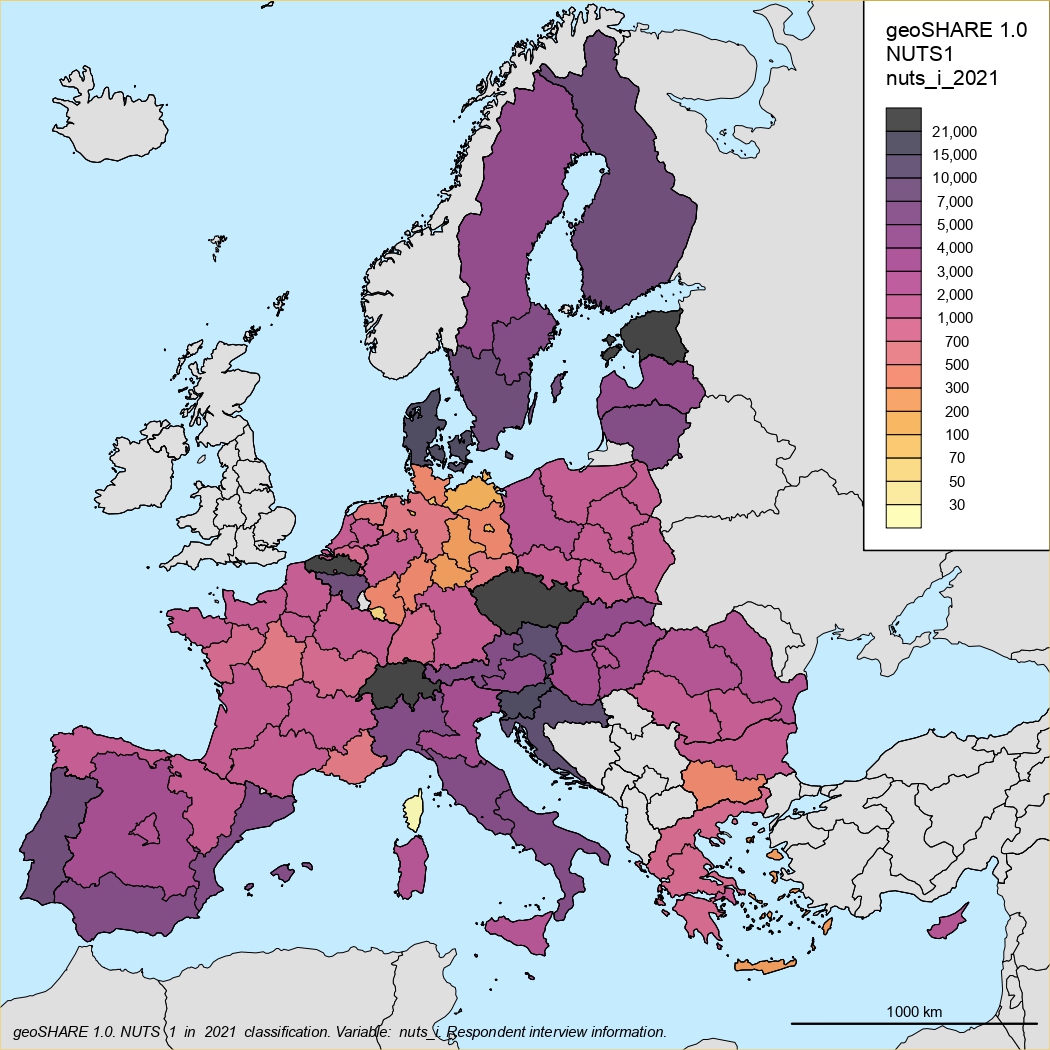

NUTS0 classification
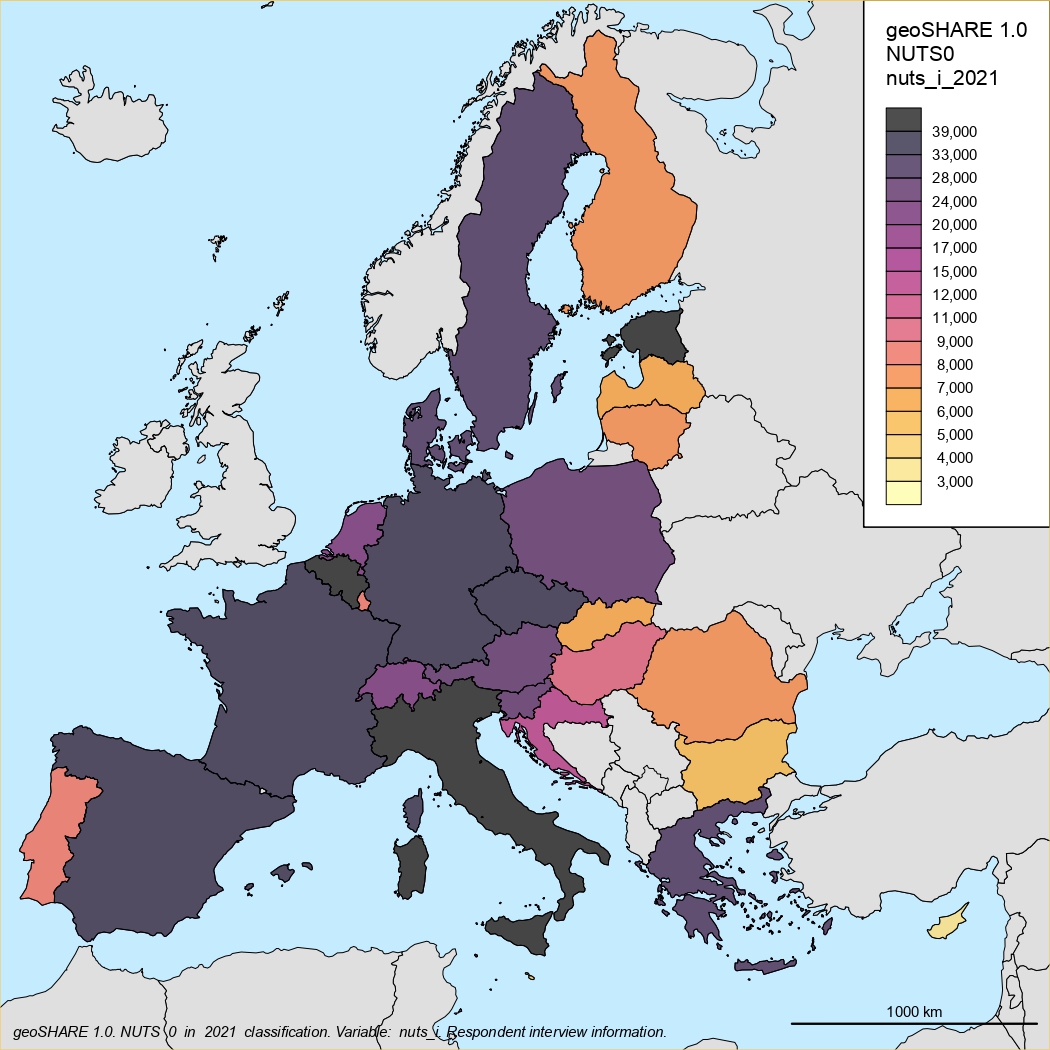

neuroSHARE
The neuroSHARE Remote Study in Switzerland
The original neuroSHARE Study will be adapted to a remote version for a data collection in Switzerland in wave 11. The project will be expanded to new tests of facial motion and hearing. The cost efficiency of the neuroSHARE Study will be substantially improved by the remote, self-administered version of all tests for a smartphone (speechtest, facial motion, and hearing) and website (sleep questionnaire) version of the tests. Data for the smell test will be collected by a olfactory papers sent by mail. The application will be developed by a joint collaboration with the First Faculty of Medicine at Charles University, the Faculty of Electrical Engineering at the Czech Technical University, and the University of Lausanne, our SHARE-CH partners. The project is generously supported by the Czech-Swiss Partnership and Funds (CZ-CH Funds).
The neuroSHARE Study in the 10th wave of SHARE
The tenth wave of the SHARE project focuses on collecting neuromarkers in the neuroSHARE project, consisting of a smell test, speech test, and questionnaire on REM sleep quality, in collaboration with the First Faculty of Medicine of Charles University and the Czech Technical University in Prague.
Three short tests are conducted immediately after the main questionnaire is completed. Speech, smell, and sleep disorders are important early markers for Parkinson’s and Alzheimer’s diseases, as well as depression. This is a unique project being tested for the first time on a large population sample. The aim of the project is the early diagnosis of these diseases, their timely treatment, and the prolongation of quality of life.
In the eleventh wave, we plan to collect even more comprehensive objective data, known as biomarkers. This project will be carried out in collaboration with the large RECETOX research infrastructure at Masaryk University in Brno.
neuroSHARE - Measurement of Neurodegenerative Diseases in SHARE Survey
Speech, olfactory (smell) and sleep dysfunctions belong among the earliest and most important signs of neurodegenerative diseases and depression. In Parkinson’s and Alzheimer’s disease, decreased sense of smell precedes the occurrence of motor and cognitive symptoms by years or even decades. Similarly, prosodic changes of speech are evident already in the prodromal stages of both diseases. Finally, the strongest risk factor for dementia or later development of Parkinson’s disease is REM Sleep Behavior Disorder.
This project implements the olfactory and speech tests on the sample of Czech respondents in the SHARE (Survey of Health, Ageing, and Retirement in Europe) project, the largest representative panel study of the population aged 50+. The measurements take place in wave 10 (2024-2025) in the Czech Republic (4,000 respondents). The sleep disorder is be captured by a short validated questionnaire. Respondents with abnormal test results are invited for medical examination.
The project is financed by the LM and LX grants from the Ministry of Education, Youth and Sports of the Czech Republic. The finances are allocated for years 2024-2025 corresponding to wave 10 of the SHARE project. These finances are grant and project specific and cannot be used for other purposes and cannot be transferred to subsequent years.
Together, these tests provide very robust biomarkers of neurodegeneration scalable to larger populations. All tests are inexpensive, noninvasive, and can be performed and assessed repeatedly. The project is the first implementation on a large, representative sample of respondents and provides unique insights and opportunities for early diagnosis and treatment in the ageing European population. The output is a part of the open-access data available to all registered users of SHARE. The methodology is be piloted in wave 10 in the Czech Republic and later used in other countries in Wave 11.
Novel Biomarkers for Early Detection of Neurodegenerative Diseases
Introduction
Speech, olfactory (smell) and sleep dysfunctions belong among the earliest and most important signs of neurodegenerative diseases. In Parkinson’s disease (PD) and Alzheimer’s disease (AD), decreased sense of smell precedes the occurrence of motor and cognitive symptoms by years or even decades. Similarly, prosodic and/or linguistic changes of speech are evident already in the prodromal stages of both diseases. Finally, the strongest risk factor for the development of PD and dementia with Lewy bodies is rapid eye movement (REM) Sleep Behavior Disorder (RBD). Thus, patients with isolated RBD represent a special case of prodromal alpha-synucleinopathy with a very high rate of conversion to a manifest neurodegenerative disorder. However, while sensitive screening tests for speech, olfactory, and sleep dysfunction are available, they often lack specificity when administered individually.
An intriguing novel approach for early, accessible detection of neurodegeneration involves analyzing altered speech and smell patterns in combination. These methods are non-invasive, inexpensive and easy to administer, even from subject’s home, making them practical for screening large populations for early signs of neurodegeneration. Speech is highly susceptible to neurodegeneration, providing a window into brain health. It reflects cognitive-linguistic and motor-execution performance but also mood and emotions via facial expression, which are all affected by neurodegeneration. Olfactory dysfunction, such as impaired odor identification and detection, often appears years before other symptoms. The brain areas responsible for processing smell, including the olfactory bulb, entorhinal cortex and hippocampus, are also some of the first regions affected by alpha-synuclein-related and Alzheimer’s-related pathology, respectively. Studies have shown that people with reduced olfactory abilities are at a higher risk of developing cognitive impairment, AD, and PD.
The largest multinational multilanguage trial performed by our team in a large sample of subjects with isolated RBD and early-stage PD showed that speech impairment severity assessed via acoustic analysis was progressive in both PD and RBD over one-year follow-up (Rusz et al. 2021). Subsequently, dysprosodic speech disorder was found in isolated RBD subjects with impaired olfactory function before the nigrostriatal dopaminergic transmission was affected (Rusz et al. 2022), indicating speech disorder as one of the earliest signs of PD occurring already in the Braak stage 2. Similar findings related to changes in prosody have been observed across variety of neuropsychiatric disorders including AD, other dementias, schizophrenia and other diseases (Rusz et al. 2024).
In addition, impaired facial expression is commonly observed in majority of neurodegenerative diseases such as AD and PD. Altered facial expression is one of the earliest distinct motor manifestations of PD (Fereshtehnejad et al. 2017). We recently showed that automatic video-based analysis of facial expression might detect PD early (Novotny et al. 2022).
The investigation of language function, a core cognitive domain in mild cognitive impairment, might provide valuable information about phenoconversion to dementia (Boschi et al. 2017). Indeed, objectively derived linguistic features of spontaneous speech were able to detect preclinical stages of dementia (Beltrami et al. 2018). The high clinical relevance of natural language and speech assessment has been recently demonstrated by our team in patients with isolated RBD. This trial showed for the first time that language screening is able to identify and distinguish patients who will later develop dementia or parkinsonism (Subert et al. 2024). In particular, language abnormalities were strong predictors of dementia with the highest hazard ratio reported in literature so far (approximately 100). These results were based only two minutes of spontaneous speech, thereby strongly supporting linguistic measures as ideal candidate markers to be employed in selecting patients for screening and future neuroprotective trials.
neuroSHARE Project Protocol
The combination of a standard olfactory test, a specially designed innovative speech test, and the REM Sleep Behavior Disorder Screening Questionnaire (RBDSQ) are currently tested in the pilot study of neuroSHARE in Wave 10 (2024-2025) in the Czech Republic with 4,000 respondents in the Survey of Health, Ageing, and Retirement in Europe, the largest representative panel study of the population aged 50+. Respondents with abnormal test results are invited for an expert medical examination. The open-access data available to all registered SHARE users.
-
Fieldwork Procedures: The neuroSHARE project is introduced to all panel and refresher respondents immediately after the completion of the main interview. Respondents are asked to provide their consent with testing and the medical examination.
-
The speech test is administered by an application on the interviewer’s computer with attached microphone. There are five tasks in the speech test: prolonged phonation, repeated syllable, reading a text, retelling of a fairy tale, and a monologue. The test is language-independent. The recorded wav files are analyzed into several parameters representing key motor and cognitive speech abnormalities such as monopitch, monoloudness, harshness, impaired timing, content richness, vocabulary range, sentence development and others.
-
The smell test is a standard olfactory assessment, previously used in HCAP and HRS, involving Sniffin’ sticks test to measure both smell identification and olfactory threshold. The sleep test - RBDSQ - is an internationally validated self-administered questionnaire. The neuroSHARE questionnaire also contains additional questions related to factors that may influence speech, smell and sleep. The total duration is about 25-30 minutes.
-
Harmonization and data delivery: Smell test is harmonized with the HRS and ELSA smell tests. Data are delivered for merging to the SHARE panel data with full documentation. Transfer, analysis, and storage of audio files and other data materials comply with GDPR requirements.
-
Medical examination: Respondents with abnormal findings (around 5 percent of respondents) in smell and speech test and abnormal RBDSQ score are invited for an expert medical examination and validation at the Department of Neurology, First Faculty of Medicine, Charles University.
-
The neuroSHARE project: is the first implementation of these tests on a large, representative sample of respondents and provides unique insights and opportunities for early diagnosis and treatment in the ageing European population. Based on the pilot study results, additional measurements might be investigated (potential long-term neuropsychiatric burden associated with depression and olfactory dysfunctions related to the Covid-19 pandemic).
-
Coordination and research team: SHARE-CZ (Radim Bohacek), First Faculty of Medicine at Charles University (Petr Dusek), Czech Technical University (Jan Rusz, Tereza Tejkalova, Vojtech Illner, Tomas Kouba).
-
Central coordination is administered by the SHARE-ERIC and the SHARE Berlin Institute. The neuroSHARE project has obtained all required approval from the Ethical Committee at the First Faculty of Medicine of Charles University. It has been supported by SHARE-ERIC Management Board, the SHARE-ERIC Scientific Monitoring Board and its chair Arie Kapteyn (USC), and the SHARE-ERIC Director, Prof. David Richter.
-
neuroSHARE in Switzerland: The methodology will be shared with other countries in the SHARE project, first with the Swiss team of SHARE-CH at the University of Lausanne in Wave 11.
For more details, see:
nutriSHARE
FFQ and 24HR Nutrition Survey in SHARE-CZ
Between wave 10 and wave 11, in the fall 2026, SHARE-CZ will collect detailed data on nutrition.
Both the FFQ (Food Frequency Questionnaire) and 24HR (24h Recall Questionnaire) are standard questionnaires used in other major surveys (NICOLA, ELSA, HRS and NHANES variants).
This research project is developed in collaboration with the First Faculty of Medicine, Charles University and General University Hospital.
Dr. Tereza Vagnerova is the scientific coordinator at the Department of Geriatrics and Internal Medicine.
Background and Aims
Diet is a key, modifiable determinant of healthy ageing, affecting cardiometabolic risk, frailty, sarcopenia, cognitive decline, and disability trajectories. However, robust diet-health analyses in ageing cohorts require dietary exposure measures that are (i) sufficiently detailed for nutrient- and food-group analyses, (ii) comparable across countries and survey waves, and (iii) feasible in older populations with heterogeneous digital skills and health constraints.
SHARE is uniquely positioned to address diet-related research questions in later life because it combines repeated, harmonized measures of health, function, socioeconomic status, and social networks across many European countries. Yet, diet has historically been under-measured in SHARE relative to its importance for life-course epidemiology. Implementing a Czech Nutrition Survey as a country-specific sub-project linked to SHARE Wave 11 creates high scientific value - it enables integration of dietary exposures with rich SHARE phenotyping and supports cross-country harmonization by aligning with instruments already used in other ageing studies.
Primary research aims of the Nutrition Survey
- To quantify key dietary exposures in adults aged 50+ in the Czech SHARE sample, including foods, nutrients, and dietary patterns, and to link these exposures with SHARE’s longitudinal health, functional, and socioeconomic outcomes from a life-course perspective.
- To enhance cross-study and cross-country comparability of dietary data within ageing research by aligning nutritional outputs with established European population studies and harmonized food and nutrient constructs.
- To improve the validity and interpretability of diet-aging associations by addressing known sources of measurement error in dietary assessment.
Objectives and Content of the Nutrition Survey
Including the collection of newly developed survey measures of nutrition in SHARE data provides important scientific value as it opens up multiple research possibilities:
- Diet-ageing trajectories: modeling associations between dietary exposures and longitudinal changes in functional status, frailty, cognition, morbidity, and health service use (leveraging repeated SHARE measures).
- Dietary patterns and inequality: analyzing dietary patterns/scores (e.g., PCA-derived patterns, cluster solutions, Mediterranean-style or other diet indices) in relation to socioeconomic position, social networks, and regional variation within an ageing population.
- Methodological research: quantifying and correcting measurement error (under-reporting, selective non-response, mode effects) and evaluating feasibility of digital dietary assessment in older adults, including mixed-mode solutions.
The Nutrition Survey is based on existing, validated, and internationally used nutrition instruments:
Questionnaires
-
Food Frequency Questionnaire (EPIC-Norfolk FFQ; EPIC-based) - captures habitual intake through a structured list (130 food lines) with standard frequency categories and portion conventions, suitable for long-term exposure ranking and trend comparisons.
Download the FFQ questionnaire here.
-
24-hour dietary recall (MyFood24; 2 administrations) - captures detailed day-level intake (one weekday + one weekend day) with automated nutrient analysis, enabling meal-pattern outputs and more granular food group exposure estimates; validation evidence supports its use in large studies as a scalable alternative to interviewer-based 24HDR.
Link to 24HR myfood harmonized questionnaires.
Both questionnaires will be in a website mode with optional CATI mode for respondents unable or unwilling to use the website mode.
Links to other nutrition studies
bioSHARE
bioSHARE: Collection of biomarkers in SHARE
Biomarker analyses have become one of the most important innovations in micro data collections in major surveys on ageing. Biomarkers improve the measurement of health status by providing information on health conditions that are not easily observed and reported by respondents. They also help to elucidate pathways connecting social and environmental factors to broad health outcomes. Biomarkers obtained from the blood include cytokines, immune system markers, molecular and cellular markers of aging, and gene expression. Coded biomarkers are available as restricted-access data linked to main longitudinal data for each respondent while the assays are stored in a long-term repository to take advantage of future scientific and technological developments.
Biomarkers have been collected in all major longitudinal ageing surveys. The Health and Retirement Study (HRS) and the English Longitudinal Study of Ageing (ELSA) collected biomarker data in 2014-2016, including venous blood samples. Twelve countries in SHARE-ERIC collected dried blood spots in wave 6 in 2014/15. Unfortunately, the Czech Republic could not join in this biomarker collection due to financial constraints and legal restrictions on fieldwork implemented by certified medical staff.
Collection of Biomarker Data in the Czech Republic: A Synergy of SHARE-CZ and RECETOX
In order to redress this gap in Czech SHARE data, a synergy between two large research infrastructures, SHARE-CZ and RECETOX at the Masaryk University in Brno, is planned for SHARE wave 11 in 2027. In full compliance with the legislation, in the Czech Republic biological samples will be collected from all respondents through sub-contracted medical facilities and analyzed by professional laboratory staff at RECETOX. Coded data will be merged with the longitudinal SHARE-ERIC data. The collection and methodology will be compatible with HRS, ELSA, SHARE-ERIC other biological sample collections. This new database, linked also to the SHARE Harmonized Cognitive Assessment Protocol (HCAP) study, will represent a unique database not only in the SHARE-ERIC but also in European and world research. This synergy will put Czech SHARE data on the forefront of world research connecting biomedicine and social sciences, opening opportunities for Czech researchers in scientific outcomes and publications.
In the planned biomarkers collection, the most important samples are venous blood (VBS) and dried blood spots (DBS). Additional measured data will include the following variables: weight, height, waist circumference, hip circumference; blood pressure and pulse; ECG electrocardiography (by a portable ambulatory machine by CardioSecur); vision, hearing, smell, speech, and balance tests; TBC vaccination mark on shoulder; lung functions as forced vital capacity (FVC), forced expiratory volume (FEV), and/or peak flow (PF). In addition, respondents will be asked to bring their medications that will be scanned by QR/barcode technology, photographed, and listed. These are the essential biomarkers that can be collected in SHARE survey conditions. As in other biomarker surveys, respondents will be informed on their test results and alerted if any of the markers is abnormal.
Biomarkers and Exposomes: In Wave 11 in 2027, all respondents in the Czech Republic will provide venous blood samples and other objective measures. Additional linkages will be provided for exposome data. Both biomarker and exposome data will be harmonized with HRS, GECC and other projects. Biomarker collection will be administered by RECETOX RECETOX Laboratories at Masaryk University, and the future coordinator of EIRENE-ERIC.
Accelerometer Study in Wave 8 in the Czech Republic
In SHARE Wave 8, data on physical activity were collected by using accelerometers. A subsample of the panel respondents were asked to wear the device (Axivity AX3) for eight consecutive days (day and night) on their upper thigh.
The SHARE accelerometer study was conducted in ten countries: Belgium, Czech Republic, Denmark, France, Germany, Italy, Poland, Slovenia, Spain, Sweden.
A detailed description of the study is available in
the SHARE Wave 8 Methodology Volume.
Raw accelerometer data is processed with ActiPASS and GGIR and resulting measures are available in the Wave 8 gv_accelerometer modules. Variables based on ActiPASS provide information on postures and activities, e.g. sitting, lying, standing, walking, as well as intensity categories, i.e. sedentary, light, moderate, and vigorous activity. Activities detected by ActiPASS are available as 1-seconds intervals. Provided metrics based on GGIR include vector magnitude (ENMO), intensity gradient, and LXMX measures. Additional datasets with information on acceleration on epoch level (5 seconds) for each participant are available.
Raw sensor data is available upon request at the SHARE-ERIC Berlin Institute.
For further details see SHARE wave 9 Release Guide.
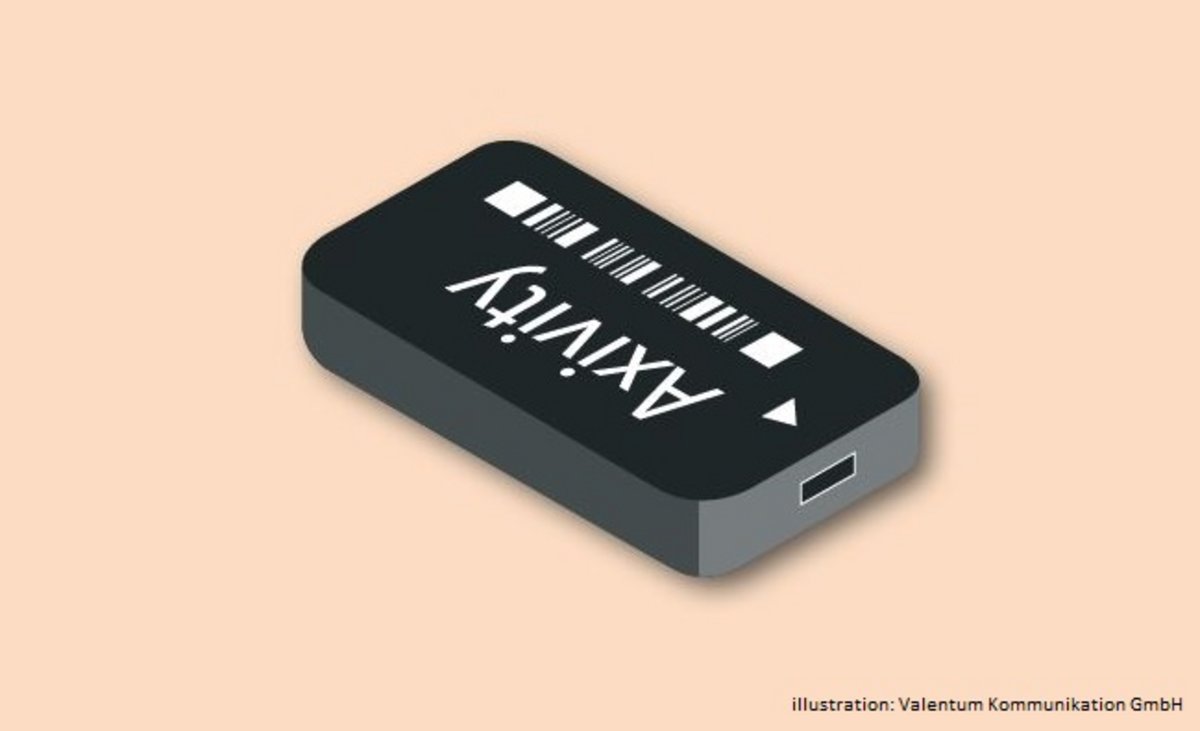

Physical measures in all waves
All waves of SHARE include objective health data (biomeasures) in form of physical performance measures: grip strength, walking speed (both strong predictors of future disability), peak flow (associated with health conditions, including dementia) and the so-called chair stand measurement (its result is a predictor of subsequent disability or hospitalization). Additionally, we ask respondents for their height and weight. Not all of the listed measures are collected in every wave, for more details see the table below.
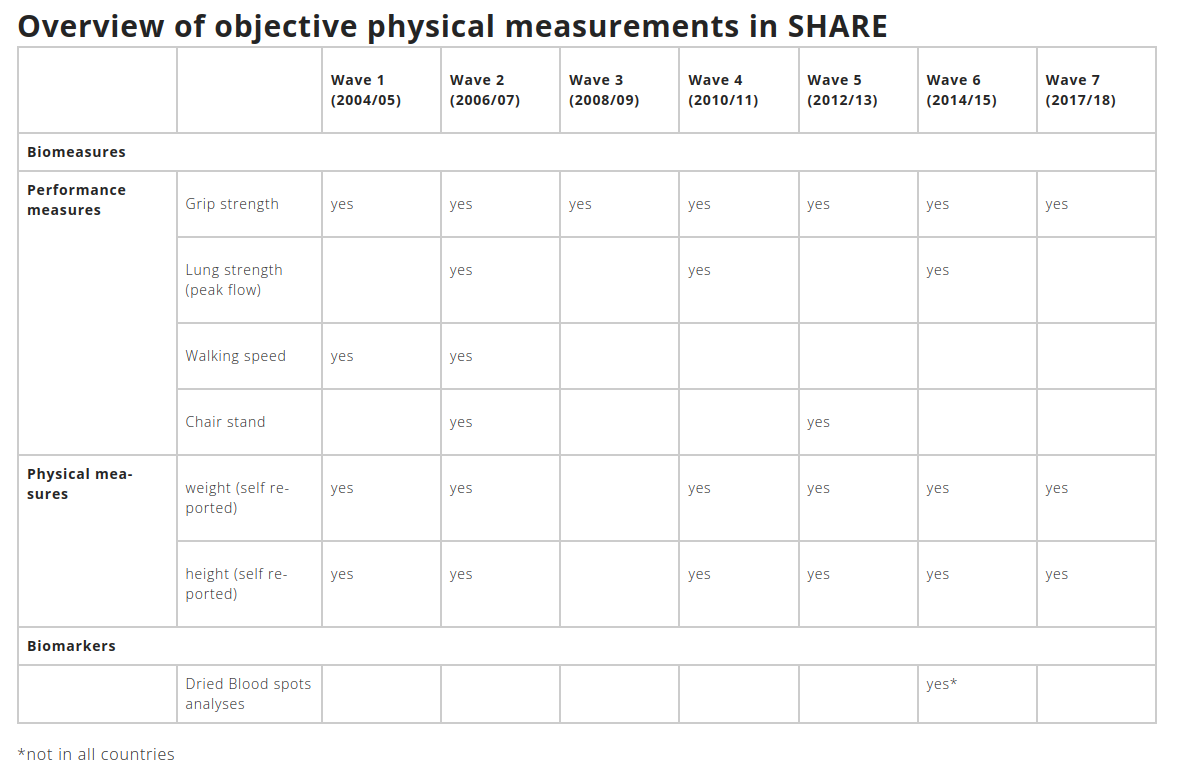

SHARE Dried Blood Spots (DBS) data
Release 1-0-0 of SHARE Dried Blood Spots (DBS) data is the first release with seven blood biomarkers serving as additional objective measures of health. Twelve countries participated in the DBS sample collection during wave 6.
Dried Blood Spot (DBS) project fosters our understanding of cross-national differences in health and their causes, especially evaluating differences in health care systems, health behaviors, and historical life circumstances. Understanding differences and causes requires comparable measurements of health which do not suffer from cross-national differences in data collection and reporting styles. In this respect, analyses of blood samples became the minimum standard of objective health measurement. SHARE, the European counterpart of HRS, has therefore collected dried blood spot (DBS) samples from about 27.000 respondents aged 50 and older in twelve Continental European countries.
The project has four specific aims:
- Capitalize upon the expertise of the laboratory at the University of Washington by having the full set of DBS collected in SHARE wave 6 assayed for the lipid panel and type-2 diabetes mellitus biomarkers relevant to general health and cognitive decline.
- Link the laboratory analyses with the SHARE functional and subjective health, demographic, social, and economic data, create a user-friendly database and archive it.
- Harmonize the data obtained from the assays of SHARE DBS, ELSA VB and HRS DBS and VB.
- Use these data to perform statistical analyses on the relationships between cross-national differences in health, economic, work and social circumstances, health behaviors and health care interventions.
More information about the DBS data collection.
easySHARE
easySHARE (version 9.0.0)
easySHARE is a simplified version of the SHARE database, designed primarily for researchers and students who are just starting with the analysis of complex longitudinal data.
While the main SHARE database is split into dozens of files by wave, easySHARE compiles information on all respondents across all countries and waves into a single dataset.
The data structure is much more user-friendly – information on respondents and their households is merged across all waves. Missing values are clearly classified and the dataset includes many derived variables (e.g., education level according to ISCED, health index, functional limitations, demographic and economic indicators).
easySHARE is fully compatible with other ageing studies (such as HRS and ELSA) and supports group registration for university teaching purposes.
Data Structure
The data are available as a single ZIP file containing information on respondents from all participating countries since 2004 (including the Czech Republic from 2006 onward). This format is ideal for teaching panel data analysis and for cross-country comparisons.
The archive also includes a Stata script used to create the easySHARE file from the main database – allowing users to trace how the variables were derived and linked, and to adapt the code for their own research.
Access to Data
The easySHARE dataset is available to registered users through the SHARE Research Data Center. Login credentials are the same as for the main database. The same terms of use apply.
Teachers can use a simplified registration form to grant students access for educational purposes.
More info: data access
Free Data Analysis in R
Guide to working with easySHARE (PDF).
easySHARE data are also available for analysis in R programming language:
http://www.r-project.org/
abmSHARE
Epidemiological Model abmSHARE
SHARE has become ever more important as a tool for evidence-based policy making due to the outbreak of the COVID-19 pandemic. SHARE is the ideal database to study the non-intended socio-economic and health consequences of the epidemiological containment decisions and the long-term effects of the COVID-19 pandemic due to its life-course and multidisciplinary approach combining health with socio-economic data. The European Commission supports a new COVID-19 research project (SHARE-COVID19) with funds provided by Horizon 2020 and the Coronavirus Global Response.
abmSHARE is an agent-based (also called individual-based or microsimulation) epidemiological spatial model adapted to SHARE and Eurostat data. It was developed for the Horizon SHARE-COVID19 project. The model was developed in collaboration with the Faculty of Biomedical Engineering at the Czech Technical University and the DNAi Ltd. programmers.
The goal of the abmSHARE model is to simulate the spread and impact of Covid-19 and similar epidemiological scenarios through realistic populations, across multiple regions, and under different intervention policies (like lockdowns, vaccines, or testing). The abmSHARE model extends the open source Covasim model into geospatial simulation and incorporation of external data.
Key Features:
- Multi-region modeling (e.g. NUTS‑2 units with inter-regional travel)
- Realistic population dynamics: households, schools, workplaces
- Simulates NPIs, testing, vaccination, reinfections
- Inputs external data from SHARE, Eurostat, or other sources
- All settings can be changed and configured via configurable simple JSON/CSV inputs
abmSHARE in the Google Colab Notebook
The abmSHARE model can be run directly in your browser inside the Google Colab notebook.
Please click abmSHARE model in the Google Colab to open the Google Colab abmSHARE site at Google Colab. There you can follow a detailed documentation and run the model. There is no need for any installation. We would be very grateful for any comments and suggestions.
The abmSHARE model is built on Covasim (COVID-19 Agent-based Simulator), an open-source agent-based model developed by the Institute for Disease Modeling available at https://github.com/InstituteforDiseaseModeling/covasim, and build with related SynthPops, an open-source synthetic population constructor developed also by Institute for Disease Modeling available at https://github.com/InstituteforDiseaseModeling/synthpops.
The model is written in python and can be adapted by users to suit their research questions and local context by specifying detailed data on population (age structure, mobility, contacts) and the epidemic (diagnosed cases, hospitalization, deaths). As in the original Covasim model, abmSHARE cab be used to explore theoretical research questions or to make projections, its main purpose is to evaluate the effect of different interventions on the epidemic. These interventions include physical interventions (mobility restrictions and masks), diagnostic interventions (testing, contact tracing, and quarantine), and pharmaceutical interventions (vaccination).
abmSHARE extends the original Covasim model in two important dimensions: it allows epidemiological simulations across geographic regions (countries, NUTS) and is able to input external data as parameters for characterizing these regions in terms of their population, policies, or socio-economic conditions, for example. The abmSHARE includes all information of the Covasim model in region-specific geospatial environment on age structure and population size in each region; realistic transmission networks in different social layers, including households, schools, or workplaces; age-specific epidemiological outcomes; and viral dynamics and transmissibility. The abmSHARE model allows for region-specific policy interventions such as non-pharmaceutical interventions (physical distancing, lockdowns), vaccinations, testing, contact tracing and quarantine, all with detailed time structure and other factors.
We are very grateful to our colleagues who collaborated on the project:
Fakulta biomedicínského inženýrství ČVUT,
DNAi Ltd,
Pireus University,
Radim Krupička, Tomáš Krajča, David Jirsa, Markéta Pechholdová, Alevtina Kuznetsova,
Tom Dasaklis,
Nikolaos Rachaniotis,
Platon Tinios.
The abmSHARE model has been built for the Horizon SHARE-COVID19 project.
For further information on the model, how to become a user, for collaboration, please contact the SHARE-CZ team at 📧 radim.bohacek@cerge-ei.cz.
SHARE Covid-19
SHARE-Covid19 CATI Project
SHARE collected two special surveys on Covid19 both in CATI mode. The first survey was collected in June-August 2020, the second CATI was collected in summer 2021.
In addition, the Czech Republic added an additional CATI-CZ Covid19 survey in October-December 2020.
All three surveys have a panel structure with repeated questions to capture changes in our respondents lives during the pandemic. All CATI Covid19 data have been linked to main longitudinal SHARE data.
CATI1, CATI-CZ and CATI2 data have been already released in open access regime.
More details can be found at SHARE-Covid19 website.
Corona Survey Release Guide is available for the whole sequence of SHARE COVID19 surveys.
Understanding non-intended consequences of epidemic control decisions to contain the pandemic
The non-intended consequences of the epidemic control decisions to contain the COVID-19 pandemic are huge and affect the well-being of European citizens in terms of economics, social relationships and health: Europe is experiencing the largest recession since World War II, social contacts have been interrupted and people avoid seeking medical treatment in fear of infection.
The overarching objective of the SHARE-Covid19 project is to understand these non-intended consequences and to devise improved health, economic and social policies. In our policy recommendations, we strive to make healthcare systems and societies in the European Union more resilient to pandemics in terms of prevention, protection and treatment of the population 50+, who represent the most vulnerable segment of the population.
The project aims to identify healthcare inequalities before, during and after the pandemic, to understand the lockdown effects on health and health behaviours, to analyse labour market implications of the lockdown, to assess the impacts of pandemic and lockdown on income and wealth inequality, to mitigate the effects of epidemic control decisions on social relationships and to optimise future epidemic control measures by taking the geographical patterns of the disease and their relationship with social patterns into account as well as to better manage housing and living arrangements choices between independence, co-residence or institutionalisation.
The project pursues a transdisciplinary and internationally comparative approach by exploiting the data sources of the SHARE research infrastructure. It covers all EU Member States. The Max Planck Society is in charge of the project coordination. The project started on 1 November 2020 and will end on 30 October 2023
Interactive database
The SHARE Data & Documentation Tool is a web application developed by CentERdata (Institute for Data Collection and Research) in collaboration with SHARE Central at the SHARE Berlin Institute. For researchers, the tool serves as a fast, customizable, and user-friendly web interface for browsing and searching the SHARE metadata.
One of the key features of the system is the ability to generate codebooks for all currently available waves and modules of the SHARE project in PDF format. This allows researchers to get an initial overview of the dataset’s content and case numbers without needing to download the data.
The “Browse Publications” tab includes all publications reported to SHARE Central, such as journal articles, books, book chapters, and other types of work like discussion papers or theses.
The “Search” function helps you quickly locate the information you need — whether across all areas, or specifically within datasets, questionnaires, or publications.
The tool is available at:
https://www.share-datadocutool.org/
You can search for SHARE publications and survey content
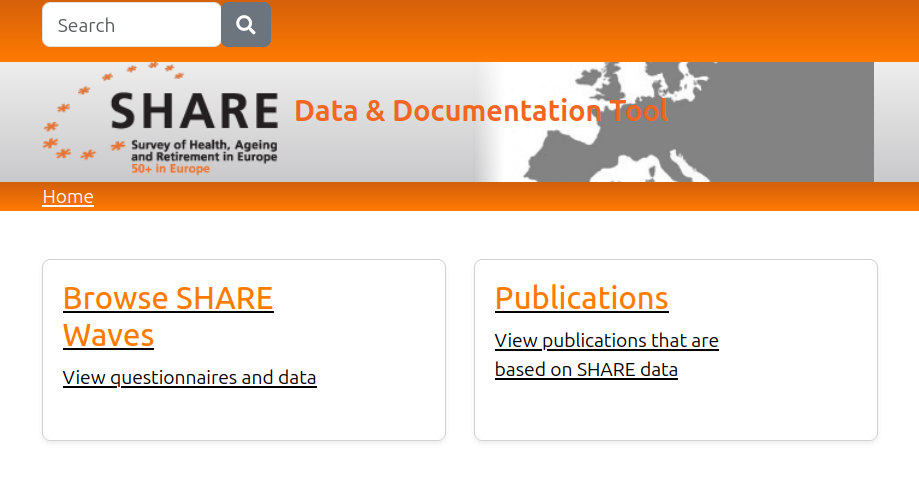

expoSHARE
We are currently preparing a proposal for cooperation with the research infrastructure EIRENE at Masaryk University within the SIRENE project in the Horizon program. The goal of the project is to connect SHARE data to exposomes.
What is the Human exposome?
People differ in their genetic predispositions, which account for 20–70% of the likelihood (depending on the disease) of staying healthy or developing chronic conditions. Health is shaped by the interaction between genetic (i.e., the human genome) and non-genetic factors, collectively called the exposome.
These factors include the quality of natural, work, and home environments; exposure to toxic substances; nutrition and dietary habits; lifestyle choices; physical activity; the use of alcohol, drugs, or medications; smoking; socioeconomic status; and psychological stress. Understanding how these factors interact is critical for advancing precision medicine and prevention. Unlike genetics, many of these factors are modifiable, offering significant opportunities for improving population health.
Assessment of Risks from Chemicals
Exposure to toxic chemicals is an important constituent of the exposome concept. Exposome research will generate new methodologies, datasets, and tools for assessing chemical exposures and associated risks applicable to chemical regulation, risk management, and health protection. In this context, the efforts of EIRENE and PARC (the Partnership for the Assessment of Risks from Chemical) are well aligned, working synergistically to advance our understanding and management of chemical exposures.
Contribution to the One Health concept
The exposome concept is not human-centered and can be applied to other species and whole ecosystems, thus providing the tools for implementing the One Health concept.
SPLASH Database
Social Policy Archive for SHARE (SPLASH)
The Social Policy Archive for SHARE (SPLASH) provides the necessary macro and contextual data (e.g. regarding political, economic, and societal environments) facilitating comparative analyses of social policies over space and time using SHARE and other microdata sources.
SPLASH Website can be accessed at https://splash-db.eu/
More specifically, the Data section gives access to contextual quantitative indicators based on official statistics and research outcomes. In the Policy section users will gain access to standardized information about policy changes and their legal supporting documents over time; the records have been compiled from the Population and Policy Database (PPD) and the Population Europe Resource Finder and Archive (PERFAR), which was last updated in 2016.
In addition, SPLASH will provide access to a data map of quantitative and qualitative external sources complementing the contents offered by the two sections.
In terms of content, SPLASH is focused on resources covering European countries organized by the following topics:
- Education
- Family & Children
- Health
- Migration
- Living Conditions
- Work & Retirement
Job Episode Panel
The SHARE Job Episodes Panel (JEP) is a generated dataset based on information of Wave 3 (SHARELIFE) and Wave 7 of SHARE. It comes in the form of a retrospective long panel. The JEP contains the labour market status of each respondent throughout her/his life. Such a retrospective panel is useful when studying the potential effects of early childhood conditions on conditions in later life or when the focus of the analysis is a low frequency phenomenon barely captured by the regular panel waves of SHARE. The JEP offers the opportunity to study life-cycle processes and the accumulative effect of important events over the life-course recorded in Wave 3 and in Wave 7. Moreover, the JEP dataset can be complemented by information about the institutions, public policies and macroeconomic conditions individuals are confronted with in the course of their lives.
A detailed description of the methodology and assumptions underlying the construction of the dataset is available in the SHARE working paper 36
and SHARE working paper 42.
The latest Release of the SHARE JEP is based on Release 9.0.0
linkSHARE
We are currently preparing a proposal to link SHARE data from the Czech Republic to administrative data. Similar SHARE data links already exist in Germany, Denmark and Finland.
SHARE-RV: Linking German SHARE Survey Data with Administrative Records
SHARE-RV stands for the direct linkage of survey data of the Survey of Health, Ageing and Retirement in Europe (SHARE) with administrative records of the German Pension Insurance (DRV).
SHARE-RV is a project within the German subsample of SHARE which started as a pilot study in 2009 and is now integrated as a standard module of the German SHARE questionnaire. Upon respondents’ consent, the German Pension Insurance provides the administrative records which can be linked to the SHARE interviews of the same person.
The combination of accurate administrative data and profound information about different aspects of the respondents’ lives in SHARE-RV provide a wide range of research possibilities.
The great advantage of SHARE-RV lies in the possibility to combine administrative data of the German Pension Insurance and contextual factors of the respondents. Hence, SHARE-RV enables the investigation of connections between various aspects of respondents´ lives and their working history or their socio-economic status in later life. In addition administrative data of persons living in the same household can be identified and analysed simultaneously.
The Release 9.0.0 of the administrative data is available now. To get access to the administrative data, please follow the steps described at the project website.
REGLINK-SHAREDK: Linking SHARE Data with data from Danish national registers
REGLINK-SHAREDK is the second successful linkage project in SHARE and relates to the Danish subsample of SHARE. The linkage in Denmark was first completed in February 2017 by establishing the project as a national research infrastructure and will be consecutively updated when new waves of SHARE are released.
For the purpose of the linkage, a consortium has been established. At present, the consortium consists of University of Southern Denmark, Aarhus University, University of Copenhagen, Copenhagen Business School, Aalborg University and Roskilde University.
The current version of REGLINK-SHAREDK is based on SHARE Release 9-0-0. This includes survey data of Danish SHARE respondents of waves 1-9 linked with health, labour market and demographic registers. Those respondents who gave their consent for linkage in Wave 8 are included. For the future, it is planned to provide further updates to the REGLINK-SHAREDK database, and at the same occasions update the register variable content. This will be done jointly with the release of SHARE Wave 10 data.
Survey participants were provided with information about the linkage project and asked for their written consent to linkage in accordance with the Danish Act on Processing of Personal Data. The linkage of Danish SHARE data with administrative records of the same person is carried out via a central personal identification number.
The database provides researchers from Danish research institutions with the ability to analyse employment behaviour, health conditions, ageing processes etc. and thereby provide evidenced based solutions to many of the societal challenges, which Denmark and many other countries in Europe are facing.
More information can be found at the Accompanying Datasets website of SHARE-ERIC.
REGLINK-SHAREFI: Linkage of Finnish SHARE data with administrative data
The REGLINK-SHAREFI project provides Finnish SHARE survey data linked to administrative data from Statistics Finland, Finnish Center for Pensions and Kela. The current version of REGLINK-SHAREFI includes all existing Finnish SHARE data based on SHARE Release 9-0-0 and the SHARE Corona Survey 1 & 2. Researchers can apply for administrative data separately. An update of REGLINK-SHAREFI is planned for future waves.
More information can be found at the Accompanying Datasets website of SHARE-ERIC.
Subsections of Results
Publications
Publications
Publications are based on reports by individual users. Please send us your publication at 📧 share@cerge-ei.cz
A complete database of all research publications, books, chapters in books, policy papers, First Result Books, working papers, and other publications based on collected SHARE data can be found at the oficial website.
Current working papers can be downloaded here.
Publications by registered users as of December 2025:
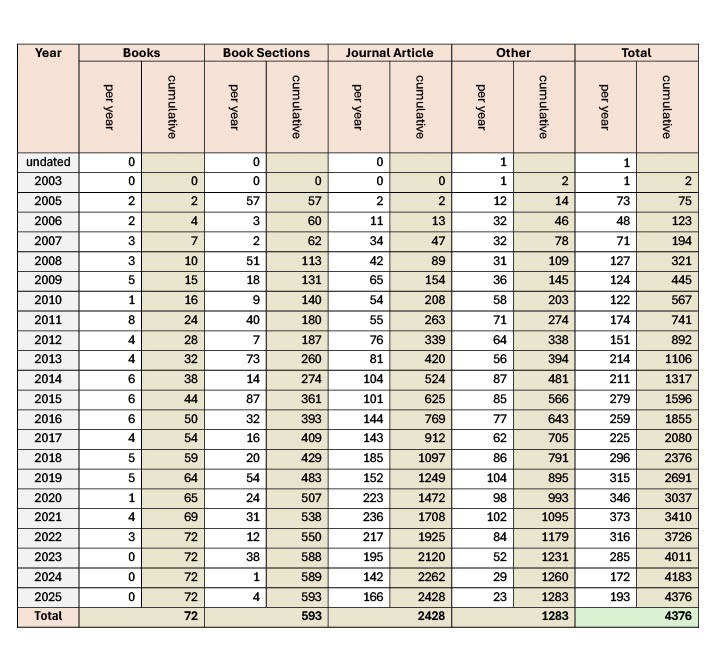

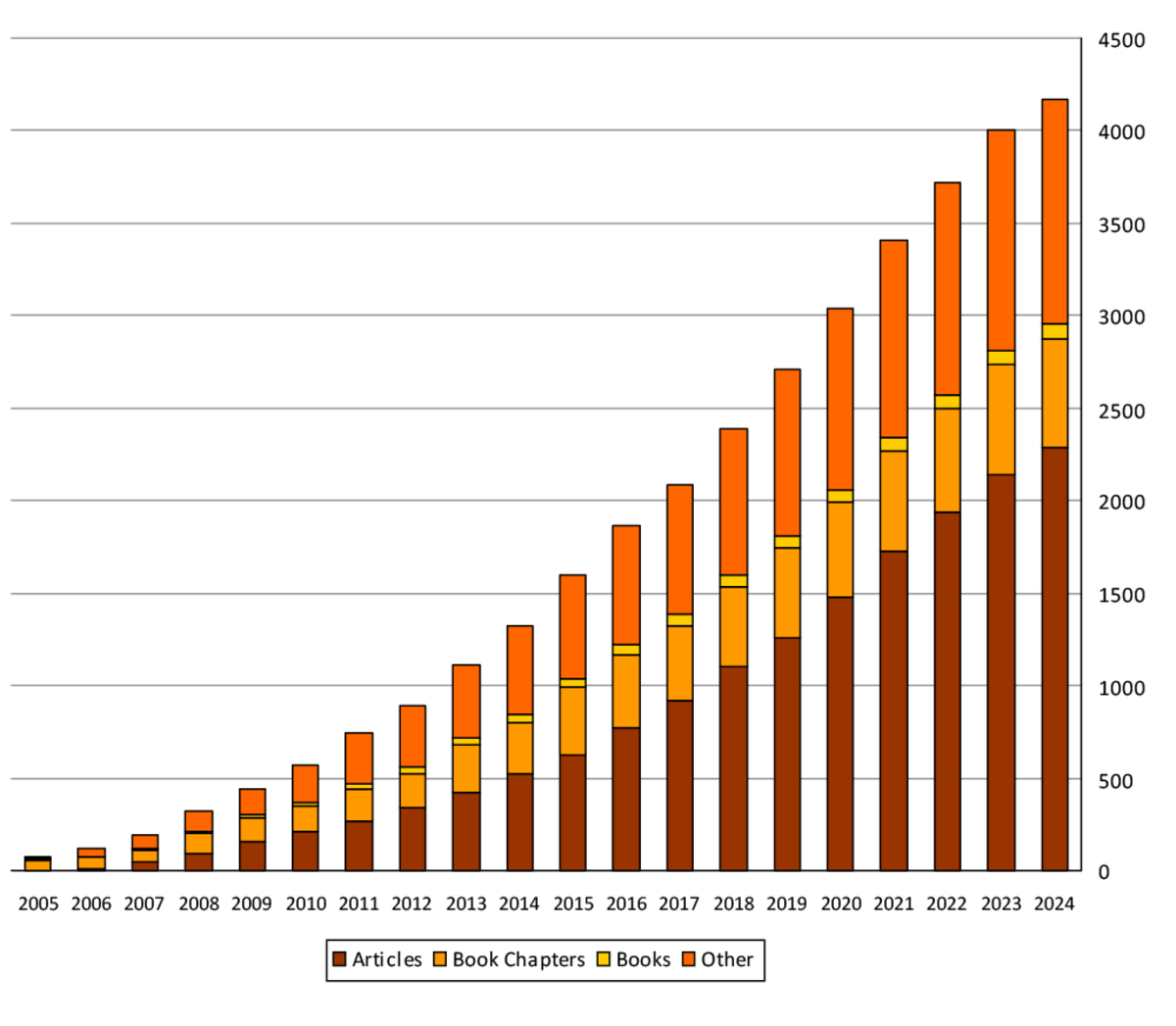

Current Release Guide of SHARE Data
Current version of the SHARE Release Guide
Release Guide Overview
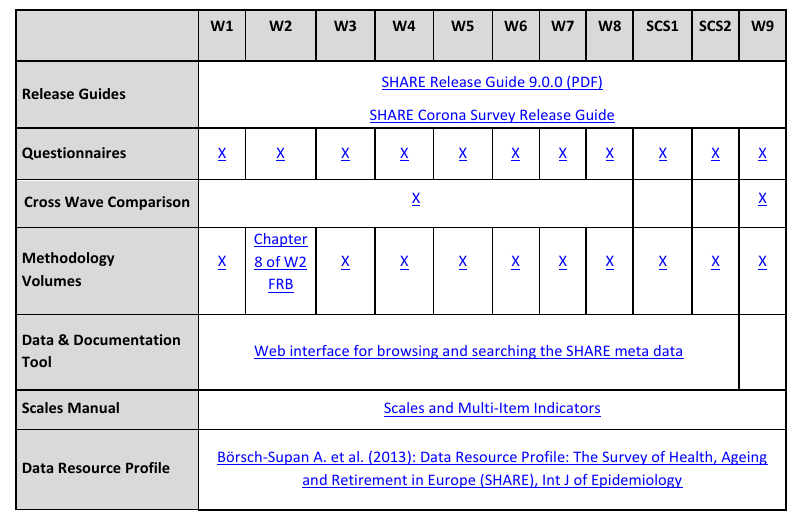

First Results Books
Börsch-Supan, A., Abramowska-Kmon, A., Andersen-Ranberg, K., Brugiavini, A., Chlon-Dominczak, A., Jusot, F., Laferrère, A., Litwin, H., Smolic, S. and Weber, G. (Eds.) (2023) Social, health, and economic impacts of the COVID-19 pandemic and the epidemiological control measures: First results from SHARE Corona Waves 1 and 2, Berlin, Boston: De Gruyter. https://doi.org/10.1515/9783111135908.
Börsch-Supan, A., J. Bristle, K. Andersen-Ranberg, A. Brugiavini, F. Jusot, H. Litwin, G. Weber (Eds.) (2019). Health and Socio-Economic Status over the Life Course. First Results from SHARE Waves 6 and 7. Berlin: De Gruyter
Börsch-Supan, A., T. Kneip, H. Litwin, M. Myck, G. Weber (Eds.) (2015). Ageing in Europe - Supporting Policies for an Inclusive Society. Berlin: De Gruyter.
Börsch-Supan, A., M. Brandt, H. Litwin and G. Weber (Eds.) (2013). Active ageing and solidarity between generations in Europe: First results from SHARE after the economic crisis. Berlin: De Gruyter.
Börsch-Supan, A., M. Brandt, K. Hank and M. Schröder (Eds.) (2011). The individual and the welfare state. Life histories in Europe. Heidelberg: Springer
Börsch-Supan, A., A. Brugiavini, H. Jürges, A. Kapteyn, J. Mackenbach, J. Siegrist and G. Weber (Eds.) (2008). First results from the Survey of Health, Ageing and Retirement in Europe (2004-2007). Starting the longitudinal dimension. Mannheim: Mannheim Research Institute for the Economics of Aging (MEA).
Börsch-Supan, A., A. Brugiavini, H. Jürges, J. Mackenbach, J. Siegrist and G. Weber (Eds.) (2005). Health, ageing and retirement in Europe – First results from the Survey of Health, Ageing and Retirement in Europe. Mannheim: Mannheim Research Institute for the Economics of Aging (MEA).
Methodology
You can dowload all methodology publications here.
Bergmann, M., M. Wagner and A. Börsch-Supan (2024). SHARE Wave 9 Methodology: From the SHARE Corona Survey 2 to the SHARE Main Wave 9 Interview. Munich: SHARE-ERIC.
Yilmaz, Y., Lasson, S., Hannemann, T., Schuller, K., Börsch-Supan, A. (2023). SHARE Compliance Profiles – Wave 9. Berlin: SHARE Berlin Institute.
Schuller, K, Lasson, S., Sand, G., Bergmann, M., Pflüger, S.-M., Hannemann, T., Börsch-Supan, A. (2021). SHARE Compliance Profiles – Wave 8. Munich: MEA, Max Planck Institute for Social Law and Social Policy.
Bergmann, M., A. Scherpenzeel and A. Börsch-Supan (Eds.) (2019). SHARE Wave 7 Methodology: Panel Innovations and Life Histories. Munich: Munich Center for the Economics of Aging (MEA).
Malter, F.; Schuller, K. and Börsch-Supan, A. (2018). SHARE Compliance Profiles – Wave 7. Munich: MEA, Max Planck Institute for Social Law and Social Policy.
Malter, F.; Schuller, K. and Börsch-Supan, A. (2016). SHARE Compliance Profiles – Wave 6. Munich: MEA, Max Planck Institute for Social Law and Social Policy.
Other publications by SHARE-ERIC
Bohacek Radim, Jirsa David, Ferrari Irene, Pasini Giacomo (2025). geoSHARE 1.0: Geographic information in regular SHARE waves. SHARE Working Paper Series 96-2025, SHARE BERLIN Institute, https://doi.org/10.6103/wp.962025
Franzese Fabio, Benjamin Chinenye (2025). Accelerometer-measured physical activity and ADL/IADL impairment: A two-year follow-up analysis. SHARE Working Paper Series 97-2025, SHARE BERLIN Institute, https://doi.org/10.6103/wp.972025
Herold Imke, Irving Jessica, Bethmann Arne, Pettinicchi Yuri (2025). Cross-European consent to data linkage in the ageing population of 28 countries. SHARE Working Paper Series 99-2025, SHARE BERLIN Institute, https://doi.org/10.20944/preprints202506.1027.v1
Hunsicker Charlotte, Bethmann Arne, Fabel Theresa, Thumann Barbara, Schütz Johanna, zur Kammer Kenneth, Hudelmayer Annika, Reiter Herwig, Buschle Christina (2025). Testing Qualitative Pretest Interviews in the Questionnaire Development Process of the Survey of Health, Ageing and Retirement in Europe (SHARE). SHARE Working Paper Series 103-2025, SHARE BERLIN Institute, https://doi.org/10.20944/preprints202510.2466.v1
Kammer Kenneth, Schütz Johanna, Hudelmayer Annika, Hunsicker Charlotte, Bethmann Arne (2025). Measuring computer skills of older people in SHARE: Evaluation of the item IT003_PC_Skills (IT module) using qualitative pretest interviews. SHARE Working Paper Series 98-2025, SHARE BERLIN Institute, https://doi.org/10.6103/wp.982025
Bruijne Marika, Kalwij Adriaan (2024). Switching survey mode between CAPI and CAWI: A report from the field. SHARE Working Paper Series 93-2024, SHARE BERLIN Institute, https://doi.org/10.17617/wp.932024
Couper Mick P., Jäckle Annette (2024). Participation and selection bias. SHARE Working Paper 92-2024, SHARE BERLIN Institute, https://doi.org/10.6103/wp.922024
Bergmann Michael, Bethmann Arne (2023). SHARE Sampling Guide 10. SHARE Working Paper 87-2023, Munich Center for the Economics of Aging (MEA), https://doi.org/10.6103/wp.872023
Franzese Fabio, Khourshed May, Scherpenzeel Annette, Angleys Nora, Weiss Luzia, Börsch-Supan Axel (2023). Device-measured physical activity of older Europeans. The SHARE accelerometer study. SHARE Working Paper Series, 85-2023, SHARE BERLIN Institute, https://doi.org/10.6103/wp.852023
Otero, M., Douhou, S., Pettinicchi, Y., Sommer, E., Ludmark, V.P., Rieckmann, A. and Börsch-Supan, A. (2023), European adaptation of the Harmonized Cognitive Assessment Protocol: Methodological lessons learned from SHARE-HCAP. Alzheimer’s Dement., 19: e063042. https://doi.org/10.1002/alz.063042
Franzese Fabio (2023). How to use multiple imputations in Stata A practical introduction for SHARE data. SHARE Working Paper 88-2023, Munich Center for the Economics of Aging (MEA), https://doi.org/10.6103/wp.882023
Börsch-Supan, Axel, Abramowska-Kmon, Anita, Andersen-Ranberg, Karen, Brugiavini, Agar, Chlon-Dominczak, Agnieszka, Jusot, Florence, Laferrère, Anne, Litwin, Howard, Smolic, Sime and Weber, Guglielmo. Social, health, and economic impacts of the COVID-19 pandemic and the epidemiological control measures: First results from SHARE Corona Waves 1 and 2, Berlin, Boston: De Gruyter (2023).. https://doi.org/10.1515/9783111135908
Yilmaz, Y., Lasson, S., Hannemann, T., Schuller, K., Börsch-Supan, A. (2023). SHARE Compliance Profiles – Wave 9. Berlin: SHARE Berlin Institute.
Groh, R., Weiss, L. M., Börsch-Supan, M., Börsch-Supan, A. (2022). Effects of Spot Size on Biomarker Levels of Field-Collected Dried Blood Spots – A new Algorithm for Exact DBS Size Measurement. American Journal of Human Biology; https://doi.org/10.1002/ajhb.23777
Bergmann Michael, Franzese Fabio, Schrank Francesca (2022). Determinants of consent in the SHARE Accelerometer study. SHARE Working Paper Series, 78-2022 Munich Center for the Economics of Aging (MEA), https://doi.org/10.17617/2.3372782
Bergmann Michael, Kneip Thorsten, De Luca Giuseppe, Scherpenzeel Annette (2022). Survey participation in the Eighth Wave of the Survey of Health, Ageing and Retirement in Europe (SHARE). SHARE Working Paper Series 81-2022, Munich Center for the Economics of Aging (MEA), https://doi.org/10.17617/2.3390284
Bergmann, M. & Börsch-Supan, A. (2021). SHARE Wave 8 Methodology: Collecting cross-national survey data in times of COVID-19. Munich: MEA, Max Planck Institute for Social Law and Social Policy. ISBN 978-3-00-069877-4
Schuller, K., Lasson, S., Sand, G., Bergmann, M., Pflüger, S., Hannemann, T., Börsch-Supan, A. (2021). SHARE Compliance Profiles – Wave 8. Munich: MEA, Max Planck Institute for Social Law and Social Policy.
Börsch-Supan, A., Weiss, L. M., Börsch-Supan, M., Potter, A., Cofferen, J., & Kerschner, E. (2021). Dried Blood Spot Collection, sample quality and fieldwork conditions: Structural validations for conversion into standard values. American Journal of Human Biology; https://doi.org/10.1002/ajhb.23517
Börsch-Supan Martina, Weiss Luzia, Andersen-Ranberg Karen, Börsch-Supan Axel (2020). Collection of Dried Blood Spots in the Survey of Health, Ageing and Retirement in Europe (SHARE): From Implementation to Blood-Marker Analyses. SHARE Working Paper Series, 47-2020 Munich Center for the Economics of Aging (MEA), https://doi.org/10.17617/2.3245285
Bergmann, M. & Scherpenzeel, A. (2020). Using field monitoring strategies to improve panel sample representativeness: Application during data collection in the Survey of Health, Ageing and Retirement in Europe (SHARE) in Survey Methods: Insights from the Field, Special issue: Fieldwork Monitoring Strategies for Interviewer-Administered Surveys. DOI:10.13094/SMIF-2020-00003
Friedel, S., & Birkenbach, T. (2020). Evolution of the Initially Recruited SHARE Panel Sample Over the First Six Waves. Journal of Official Statistics, 36(3), 507-527. https://doi.org/10.2478/jos-2020-0027
Scherpenzeel, A., etal. (2020). Collecting survey data among the 50+ population during the COVID-19 outbreak: The Survey of Health, Ageing and Retirement in Europe (SHARE). Survey Research Methods, 14(2), 217–221. https://doi.org/10.18148/srm/2020.v14i2.7738
Lectures and Presentations
A complete database of all research publications, books, chapters in books, policy papers, First Result Books, working papers, and other publications based on collected SHARE data can be found at the oficial website.
Selected Lectures and Presentations in Czech and English
Presentation SHARE SYRI (2025). Radim Boháček (pdf)
Presentation neuroSHARE Biomarker Network (2025). Vojtech Illner (pdf)
Presentation SHARE Biomarker Network (2025). Radim Boháček (pdf)
Presentation SHARE conference Athens (2025). Radim Boháček (pdf)
Presentation SHARE conference Cyprus (2024). Radim Boháček (pdf)
Presentation SHARE Berlin Institute (2023). Radim Boháček (pdf)
Lecture Demografic trend, retirement and senior care (2022). Filip Pertold (pdf)
Lecture Older workers in the labor market: Lessons for a pension reform (2021). Filip Pertold (pdf)
Lecture Multigenerational Educational Mobility in Europe (2022). Miroslava Federicova and Filip Pertold (pdf)
Lecture Teachers Turnover (2022). Miroslava Federicova (pdf)
Lecture Older workers in the labor market: Lessons for a pension reform (2021). Filip Pertold (pdf)
Lecture Effects of pandemic on gender (2020). Filip Pertold (pdf)
Poster EALE (2020)
Lecture IDEA (2020). Filip Pertold (pdf)
Lecture AEDE (2020). Miroslava Federičová (pdf).
Lecture Univesidad Autonoma Barcelona (2020). Radim Bohacek (pdf)
Lecture Otaru World Heatlh Econometrics (2019). Radim Bohacek (pdf)
Data workshop SHARE at Mendel University in Brno (2017). Jaroslava Pospíšilová (pdf)
Presentation SHARE Conference (eng)aging in Prague (2017). Axel Borsch-Supan (pdf)
Presentation SHARE at Mendel University in Brno (2016). Radim Boháček (pdf)
Presentation SHARE: National Dropoff Questionnaire (2016). Radim Boháček (pdf)
Presentation SHARE: Conference nestárneme (2015). Radim Boháček (pdf)
Presentation SHARE: Parliament of the Czech Republic (2015). Radim Boháček (pdf)
Presentation SHARE: Domácí péče (2015). Radim Boháček (pdf)
Presentation SHARE-IDEA: Studie odchodu do důchodu (2015). Radim Boháček (pdf)
Presentation SHARE-IDEA: Studie odchodu do důchodu (2015). Jana Bakalová (pdf)
Presentation SHARE-IDEA: Studie odchodu do důchodu I (2015). Daniel Munich (pdf)
Presentation SHARE-IDEA: Studie odchodu do důchodu II (2015). Daniel Munich (pdf)
Presentation of SHARE Project Fórum pro udržitelný rozvoj (2014). Radim Boháček (pdf)
Presentation of SHARE Project in the Parlament of the Czech Republic (2014). Radim Boháček (pdf)
Presentation of SHARE Project Conference (ne)stárneme (2014). Radim Boháček (pdf)
Presentation of SHARE Project: Alternativa 50+ (2014). Jana Hamanová (pdf) Radim Boháček (pdf)
Presentation of SHARE Project (2013). Filip Oliva (pdf)
Presentation of SHARE Project: NGO Domácí péče a bydlení (2013)
Presentation of SHARE Project at the Senate of the Czech Republic (2012)
Presentation of SHARE Project (2011)
Radim Boháček (pdf). Jana Hamanová and Michal Svoboda (SCaC) (pdf). Petr Ventluka (MŠMT) (ppt)
Presentation of SHARE Project (2009). Presentation of SHARE Project (pdf). Labor force participation and retirement (pdf). Life of 50+ generation (pdf). The role of the Ministry of Education, Youth and Sports in SHARE (pdf)
Selected Results SHARE (2008). In CZ: (pdf). In EN: (pdf).
Press release on the occasion of the first data release in the Czech Republic (Czech): (pdf)
Research News
New Cross-European Survey Module Unveiled to Capture Social Aspects of the Green Transition
The SoGreen project has launched a new survey module designed to measure the social dimensions of the green transition. Developed through a collaboration between four leading European social science research infrastructures, Survey of Health, Ageing and Retirement in Europe (SHARE), Generations and Gender Programme (GGP) , European Social Survey (ESS), and Growing Up in Digital Europe (GUIDE), the SoGreen Module aims to provide robust, comparative data on how individuals experience and respond to the climate crisis and related policies.
With growing recognition that the green transition must be not only environmentally sustainable but also socially just, the module addresses key issues such as energy and transport poverty, job security, health impacts, and access to infrastructure. It also explores attitudes toward climate change, trust in institutions, perceived risks, and willingness to adopt pro-environmental behaviours.
The module comprises 30 concise items grounded in previous survey efforts and refined through expert feedback and cognitive testing. It will be fielded across 17 European countries using established platforms such as ESS-CRONOS, SHARE SCQ, GGS-IBWS, and GUIDE CIPS. The integration of survey data with geospatial and environmental indicators will provide an unprecedented opportunity to assess how socio-economic factors and local conditions shape the experience of the green transition.
The SoGreen Module marks a significant advancement in social science tools available for the analysis of climate policy impacts, supporting the European Green Deal’s goal of a fair transition for all.
Release 1.0.0 of SHARE-HCAP 1 is available
Data Release 1.0.0 of SHARE-HCAP 1 (Harmonized Cognitive Assessment Protocol). The HCAP 1 study contains in-depth measurements of cognition with a selected sub-sample of SHARE respondents in five countries. Further information is available at the SHARE data portal
EU Commission Grant: four leading social science infrastructures in Europe SHARE ERIC, ESS ERIC, GGP and GUIDE cooperate in the SoGreen project
New project funded by the EU Commission started on January 1st to investigate the social aspects of the green transition Berlin, January 2025. The SoGreen project is set to combine the capabilities of the four leading European social science infrastructures: SHARE ERIC, ESS ERIC, GGP, and GUIDE. This ambitious initiative aims to uncover groundbreaking insights into how the green transition impacts different generations and socioeconomic groups across Europe, all through the lens of a life-course perspective.
The project will deliver a suite of cutting-edge services, including innovative tools, tailored questionnaire modules, and advanced solutions that shine a spotlight on the social dimensions of the green transition. What sets SoGreen apart is its unique longitudinal and multi-generational approach, which integrates fresh data with state-of-the-art analytical frameworks. By combining survey datasets with geospatial data and deploying innovative visualization tools, the project promises to deliver unparalleled insights into the green transition at both national and regional levels.
At the heart of SoGreen lies innovation and collaboration. A new Green Transition Questionnaire Module will harmonize how environmental themes are explored across the surveys, ensuring coherence and depth. The consortium will also create harmonized datasets and launch a joint dissemination platform, making the data more accessible and fostering consistency in analysis across studies. Driving engagement and dialogue is the Knowledge Mobilisation Lab – a new platform designed to connect policymakers, researchers, NGOs, and private sector stakeholders. By cultivating this dynamic network, SoGreen aims to shape the discourse on the green transition and deliver actionable insights that influence policy and societal developments.
SHARE-Gateway User Conference
Berlin – From November 6th to November 8th, 2024, interested researchers met in Berlin to discuss research using data from SHARE and data from the broader international network of health and retirement studies supported by the Gateway to Global Aging Data. This interdisciplinary SHARE-Gateway User Conference has been jointly organized by the SHARE BERLIN Institute and Gateway to Global Aging Data.
Especially in view of the present population ageing fostering research that investigates cross-country and historical variation in ageing, health, and systems supporting older individuals and their families is key. Therefore, the aim of the conference was to stimulate collaboration and to foster scientific exchange between users on research evaluating a range of topics covered in the international network, especially cross-country work on health, aging, and retirement.
Furthermore, on November 6th the SHARE BERLIN Institute hosts the Symposium on Inequalities in Health, Retirement, and Care in an Ageing World. This event comprised four different session and gave interesting insights in current research about health behaviour, living circumstances at older ages, healthy ageing, challenges in later life, etc.
SHARE-RV Release 9.0.0 is available
Administrative data linked up to SHARE Wave 9 from the German record linkage project comprises updated data of the German Pension Insurance. The administrative data sources – VSKT (employment histories on a monthly base) and the RTBN (information on pensioners) – are available up to reporting year 2022. SHARE-RV links the administrative data to all German SHARE data up to Wave 9 as well as to the SHARE Corona Survey.
SHARE-COVID19 Project - Final Dissemination Conference
As the project term ended in June 2024, a final conference was held in Brussels on June 26th 2024 to present and discuss the final results and policy recommendations of the SHARE-COVID19 research project. The SHARE-COVID19 project was funded by the European Commission to better understand the non-intended consequences of the epidemic control decisions to contain the COVID-19 pandemic and to devise improved health, economic and social policies.
The presentations focused on policy recommendations for healthcare, health, labor markets, adressing the inequality of income and wealth, social and intergenerational relationships as well as housing and living arrangements.
More information about the SHARE-COVID19 project can be found here or on the project’s website.
EUCOVII Project
EUCOVII is the follow-up project of EUCOV enforcing common procedures and conducting data collection across EU member states.
The overall aim is to maintain full EU coverage in SHARE Wave 10 to provide the largest possible SHARE database to the research community, the EU Commission, and supranational organisations. This includes all final preparations and the start of the main data collection of Wave 10, data cleaning and data release in 11 SHARE member countries. The overall aim will be achieved by extending the support of DG Employment, Social Affairs and Inclusion in the eight EU member states that joined SHARE in Wave 7 (BG, CY, FI, LT, LV, MT, RO, SK) with the exception of Latvia, which was able to secure national funding for Wave 10, and in four “crisis countries” (EE, ES, GR, PT). The project will provide the basis for new data in the areas of long-term care, healthcare, informal care, labour force participation, work-life balance, pensions, and access to social protection of respondents aged 50 and older. Moreover, in combination with data from the two SHARE Corona Surveys, this project will shed light on the social and economic disruptions and other long-term effects of COVID-19 and the epidemic control decisions.
First REGLINK-SHAREFI linked data available
REGLINK-SHAREFI stands for the direct linkage of survey data of the Finnish Survey of Health, Ageing and Retirement in Europe (SHARE) with register data from Statistics Finland, the Finnish Center for Pensions and Kela.
The first data version of the Finnish record linkage project includes survey data of Finnish SHARE respondents of Waves 7-9 who gave their consent for linkage in Wave 8 or Wave 9. It is possible for researchers who are registered users of SHARE to get access to REGLINK-SHAREFI.
More information at REGLINK-SHAREFI website.
SHARE-COHESION for Upgrading SHARE-ERIC
The Achilles heel of SHARE, very much like the European Union itself, lies in the centrifugal forces of the member states with their different policies, priorities and abilities to pay. These centrifugal forces have increased with the number of countries and endanger the cohesion of SHARE as a pan-European infrastructure, especially our ability to harmonise the scientific content and the survey methods across SHARE’s member countries. SHARE’s strategy to counter these centrifugal forces has been, from its very beginning, to establish a strong central coordination, which is financially independent.
Aims
The overarching aim of this project is therefore to strengthen the centralised approach of SHARE in order to combine scientific excellence with cohesion across all 28 SHARE member countries. To reach this aim, several objectives are set in SHARE Waves 8, 9, and 10:
- Supporting the supranational innovation and development tasks to be executed by the Area Coordinators (scientific content)
- Supporting the survey designers (fieldwork methods and electronic tools)
- Funding training as it is instrumental for internal cohesion, especially in the scientifically less developed Member States and their participating SMEs
- Due to COVID-19, adaptation and revision of scientific content, electronic tools, interview mode, and training procedures, plus implementation of the first SHARE Corona Survey including data release
- An extension of the cognitive function module in SHARE by adding further tests in close coordination with the US Health and Retirement Study
- A time expenditure module measuring how much time people over 50 years old spend on different activities while keeping track of changes in their time expenditure after retirement, after changes in their living situation or after a health shock
- The collection of physical activity data using accelerometry
- A saving regret module, asking panel members of 65 and older whether they regret the savings paths they took earlier in life and which saving choices they would have preferred in hindsight
- A panel version of the social network module, which tracks changes in respondents’ interpersonal milieu over time and a social integration index
- Improvement of the “jobcoder” (list of occupational titles across countries)
- Preparing the laboratory results from the dried blood spot samples (DBSS), which were collected in Wave 6
- Survey methodological innovations include a retention stimulation programme, improvement of sampling frames, a better targeting of respondents in institutions, and more efficient fieldwork monitoring
- SHARE Interviewer Survey to evaluate interviewer strategies
- In reaction to COVID-19: adaptation and revision of scientific content, electronic tools, interview mode, and training procedures, plus implementation of the first SHARE Corona Survey including first data release.
Release 1-0-0 of SHARE Dried Blood Spots (DBS) data
Release 1-0-0 of SHARE Dried Blood Spots (DBS) data is the first release with seven blood biomarkers serving as additional objective measures of health. Twelve countries participated in the DBS sample collection during wave 6.
More information about the DBS data collection.
SHARE Wave 9 Methodology Volume is published
“From the SHARE Corona Survey 2 to the SHARE Main Wave 9 Interview” volume documents the most important questionnaire innovations, methodological advancements and new procedures introduced during the second SHARE Corona Survey and the ninth wave of SHARE.
The most recent data collection of SHARE started with the second SHARE Corona Survey, enabling to study (intra-individual) changes between the start of the pandemic and the situation one year later in a cross-national perspective. Only a few months later, SHARE returned to the regular face-to-face interviewing for the SHARE Wave 9 survey.
SHARE-ERIC Council adopts extension of SHARE after 2024
SHARE, the Survey of Health, Ageing and Retirement in Europe, is a research infrastructure for studying the effects of health, social, economic and environmental policies over the life-course of European citizens and beyond. From 2004 until today, 530,000 in-depth interviews with 140,000 people aged 50 or older from 28 European countries and Israel have been conducted in nine waves of data collection. According to its current statutes, SHARE would have ended in 2024 with its tenth wave.
However, SHARE has consistently increased its productivity in producing scientific output and support for evidence-based policy advice. In its SHARE-ERIC Council Meeting on 17 May 2022, the members of the SHARE-ERIC Council therefore unanimously adopted the decision to extend the duration of SHARE-ERIC beyond 2024.
In 2011, SHARE became the first European Research Infrastructure Consortium (ERIC) ever. Over the past years, SHARE has proven its value multiple times. The risks to health even in modern times became obvious during the COVID-19 pandemic. SHARE reacted quickly and established two telephone surveys (Corona Survey 1 and 2). The released data allows researchers to examine the pandemic’s effects on people´s economic situation, social relationships and health. Furthermore, the effects of demographic change in Europe´s ageing societies are getting dramatic with the baby boomers retirement. Therefore, SHARE´s longitudinal data, cross-country comparisons and research with a lifecycle perspective are needed to investigate how people cope with a changing world – who gains and who loses.
Foundation for the Council’s decision and a first step to long-term sustainability was the creation of the SHARE Berlin Institute in March 2022, which will house the international coordination of SHARE. Both processes - the move of SHARE from Munich to Berlin with the founding of the SHARE Berlin Institute and the continuation of SHARE-ERIC beyond 2024 - are key steps to sustain the SHARE research infrastructure with a stable central organization.
SHARE-ERIC New Host Institution in Berlin
The Survey of Health, Ageing and Retirement in Europe (SHARE) will enrich the science location Berlin. The founding partners now signed the partnership agreement for the new SHARE Berlin Institute. SHARE will in future be embedded in a collaboration of four leading research institutions: the WZB Berlin Social Science Center, the German Institute for Economic Research (DIW Berlin), the Charité – Universitätsmedizin Berlin and the German Centre of Gerontology - Deutsches Zentrum für Altersfragen (DZA). The new institute will also work closely with the Robert-Koch-Institute (RKI).
The new institute is a positive signal for the Berlin research landscape. It will strengthen Berlin as a hub for international, data-based research. Thanks to its participating leading research institutions, the research network will also advance interdisciplinary and international research in Germany.
New Objective health measures in SHARE introduced in Wave 8
Objective health measures have been an important part of SHARE from its beginning. In its eighth Wave, SHARE implemented the collection of thigh-worn accelerometer data to objectively measure physical behaviour of respondents aged 50 years or older. In June 2021, the first scientific version of these accelerometer data was made available as part of Release 1.0.0 of SHARE Wave 8. Since February 2022, updated accelerometer data are available within SHARE Release 8.0.0.
Data collection
During the main fieldwork of SHARE’s Wave 8 – in 2019 and 2020 – a subsample of SHARE respondents participated in the accelerometry project in the following ten countries: Denmark, Sweden, Italy, Spain, Czech Republic, Poland, Slovenia, Belgium, France, and Germany. Drawing the accelerometry subsample in the North, South, East and West of Europe ensured a geographic variation.
During their participation in the main SHARE interview, participants in the accelerometry project were asked to wear an accelerometer on the thigh for eight consecutive days, day and night, if possible without breaks. Their activity was recorded and stored by the device. After the wearing period, the participants sent the accelerometers to SHARE, where the project’s researchers extracted the collected data. In March 2020, the entire fieldwork – including accelerometer measurements – was stopped due to the COVID-19 pandemic. Nevertheless, valid accelerometer data have been collected from 856 respondents.
Data extraction and processing
SHARE Central processed the raw accelerometer data to provide SHARE registered users aggregated measures for activity on different levels, e.g. per hour and day. Data processing was performed with GGIR, an open-source software that enables to compute various metrics of activity.
Data release
In June 2021, the first scientific version of these generated modules was made available as part of Release 1.0.0 of SHARE Wave 8. Since February 2022 release 8.0.0 is available. This new release comprises an update of the generated accelerometer modules. Minor revisions include minor changes to metrics: An updated version of GGIR was used as well as some new variables in the dataset on day-level activity, namely indicators for most and least active 8 and 16 hours of the day. The major advancement in the new release is the detailed information that is now provided in the so called “epoch” datasets. For each respondent a dataset is available that indicates physical activity (i.e. average acceleration) in 5-second intervals (so-called “epochs”) over the whole observation time. Therefore, acceleration data on epoch level enable to look at activity profiles in detail, e.g. for diurnal activity patterns.
The following generated modules in the SHARE dataset comprise the accelerometer data: “gv_accelerometer_total”, “gv_accelerometer_day”, “gv_accelerometer_hour”, and “gv_accelerometer_epochs”.
European Research Infrastructure Consortiums Establish the ERIC Forum
During the 6th, the European Research Infrastructure Consortium (ERIC) Network meeting in Helsinki, Finland, all 14 ERICs have agreed to further intensify their collaboration and to set up the ERIC Forum. A Memorandum of Understanding (MoU) for the establishment of the ERIC forum was signed by all 14 ERICs, including SHARE.
In particular, the objectives of the MoU are to identify common challenges and to jointly develop responses to them, to contribute to the further development of the ERIC Regulation and European and international research context, and to foster the visibility, impact and sustainability of ERICs.
The MoU is not legally binding but reflects a spirit of collaboration between the Forum members and is an important step towards future cooperation. According to the MoU, the ERIC forum shall meet twice a year. The next meeting will be held in Graz, Austria in November 2017.
European Research Infrastructure Consortiums (ERICs) are specific legal forms to facilitate the establishment and operation of research infrastructures with European interest. The Survey of Health, Aging and Retirement in Europe (SHARE) became the first European Research Infrastructure Consortium (ERIC) in March 2011. This gives it legal personality and capacity in all EU Member States and other partner countries of the ERIC.
The European Commission announced to support SHARE-ERIC’s COVID-19 research project (SHARE-COVID) by funding through Horizon 2020 and the Coronavirus Global Response initiative launched by President Ursula von der Leyen in May 2020.
The non-intended consequences of the epidemic control decisions to contain the COVID-19 pandemic are huge and affect the well-being of European citizens in terms of economics, social relationships and health. SHARE-COVID is aiming to answer recent and future questions about these non-intended effects. The overarching objective of this project is to devise improved health, economic and social policies and to deliver quick results for society for a higher level of preparedness of health systems.
The results will for example help to understand the lockdown effects on health and health behaviours and to analyse labour market implications. Furthermore, the impact of pandemic and lockdown on income and wealth inequality will be investigated. SHARE-COVID research also aims to mitigate the effects of epidemic control decisions on social relationships and to improve future epidemic control measures by taking geographical patterns of the disease and their relationship with social patterns into account. Another aim of SHARE-COVID research is to explore ways to improve the housing and living arrangement choices of the older generation while facing the challenges of a pandemic.
By this, SHARE strives to contribute in making healthcare systems and societies in the EU more resilient to pandemics in terms of prevention, protection and treatment of the population 50+, a most vulnerable part of the population. With this funding, the European Commission is paving the way for SHARE-ERIC to becoming a key component in processing the socio-economic consequences of the Corona pandemic in Europe and beyond.
Extension of SHARE Across All EU Countries
Tackling the common challenges of ageing societies will be substantially improved by extending the coverage of the SHARE survey to all EU member states. The fact that European societies are continuously ageing, leads to a situation that has never existed before. In order to cope with these unprecedented circumstances, EU wide collaboration is essential. SHARE, the Survey of Health, Ageing and Retirement in Europe is the largest pan-European social science panel study and able to advance this joint process.
The European Commission paved the way to include eight new countries in the survey, because SHARE is an important source of evidence which helps to better cope with challenges in the health, employment and social sector. Ageing is one of the major challenges of the 21st century. Many of the current pension systems in European countries are unsustainable. The costs of health care are steadily rising and intergenerational cohesion seems to be threatened.
SHARE now covers 26 countries of the European Union as well as Switzerland and Israel. Data from England and Ireland are collected in the harmonised studies English Longitudinal Study of Ageing (ELSA) and the Irish Longitudinal Study on Ageing (TILDA). Thus, pan-European research on effects of our ageing societies and their implications can be extended to all EU countries. Thanks to the efforts of the European Commission, SHARE is able to implement a sample size which allows country comparisons for researchers and policy analysts. Even better, many countries enlarge this sample in order to give researchers better possibilities to investigate country specific subjects and to learn more about national challenges of ageing.
Call for new content for Wave 9
The Survey of Health, Ageing and Retirement in Europe (SHARE) invites users to
submit proposals for new survey content to be fielded as a short add-on module in Wave 9 of SHARE.
The main data collection for Wave 9 is planned for 2022. The questionnaire for each wave consists of 21 core (panel) modules and several add-on-modules. Topics covered by the add-on modules in previous waves have included: Social Network, Dried Blood Spot Samples, Social Exclusion, Time Expenditure, Saving Regrets, Accelerometry.
We welcome applications from all disciplines represented in SHARE. The proposed module may include survey questions, physical and cognitive tests, or objective health measurements. Administration of the module should not exceed an expected length of 2 minutes. Based on internal and external review, one add-on module will be selected by a Scientific Evaluation Board. Evaluation criteria are: innovative scientific potential, suitability of module for administration in face-to-face CAPI interviews, use of SHARE´s cross-national and longitudinal design.
Successful applicants are expected to work in close collaboration with the SHARE team regarding questionnaire design, translation, testing and data cleaning at all stages of implementation, and present the add-on module at the Wave 9 kick-off conference in Helsinki, April 1-3, 2020.
They should be aware that the proposed module will be subject to further detailed assessment and possible amendment before being adopted. Moreover, researchers are expected to provide analysis of the module data for the SHARE topline findings publication (SHARE First Results Book or SHARE Working Paper Series) and to publish a peer-reviewed journal article using the data from the module.
Interested researchers can submit their application by filling in the application template
and sending it by email to call©share-project.org.
The SHARE Wave 7 Methodology Volume
“Panel Innovations and Life Histories” is now available online. The new book documents the most important questionnaire innovations, methodological advancements and new procedures introduced during the seventh wave of SHARE.
For more details see the Methodology volume and the Release Guide
Book release of the First Results of Waves 6 & 7
Demographic change is one of the main challenges of Europe in the 21st century. The problems it creates are complex and can only be understood through intensive observation and analysis over time. SHARE has been created to do this observation – a multidisciplinary, cross-national and longitudinal survey that uses the “natural laboratory” of Europe to better understand the ageing process.
The new book “Health and socio-economic status over the life course” gives an overview of the first results of the new wave 6 and 7 data, which is already used by national, European and global policymakers for optimal policy design. At the book release at Palais des Academies in Brussels, speakers from the European Commission and OECD underlined the policy relevance of SHARE data.
With waves 6 and 7, SHARE has added further valuable pieces to the ageing puzzle. The two new waves drive the number of respondents and interviews to 140.000 and 380.000, respectively, while now covering all 26 continental EU member states plus Switzerland and Israel. Wave 6 deepens the objective measurement of health via biomarkers, wave 7 strengthens SHARE’s longitudinal dimension by collecting life-history data in all 28 countries.
You can download the FRB Book here
FAQ SHARE
Frequently Asked Questions about the SHARE Project and Data
Detailed answers to frequently asked questions can be found in English on the official SHARE website.
Below is a summary of the most important general information.
1. What is SHARE?
SHARE (Survey of Health, Ageing and Retirement in Europe) is an international, multidisciplinary longitudinal database (i.e., it tracks the same individuals over time, every two years). It provides micro-level data on the health, socio-economic status, and family and social networks of more than 140,000 individuals aged 50+.
The data are available free of charge to researchers affiliated with an academic or research institution, and are intended for scientific purposes only.
Register for access here:
https://share-eric.eu/data/data-access
After completing and signing the user agreement, send it to the email provided. The data are stored at CentERdata (Tilburg University) and GESIS. Login credentials are provided by CentERdata.
Data formats: STATA, SPSS, R (R is free to download).
2. Which countries participate?
- Wave 1 (2004): Austria, Belgium, Denmark, France, Germany, Greece, Italy, Netherlands, Spain, Sweden, Switzerland
- 2005–2006: Israel joins
- Wave 2 (2006–2007): Czech Republic, Ireland, Poland
- Wave 3 (2008–2009, SHARELIFE): Retrospective life histories
- Wave 4 (2010–2011): Estonia, Hungary, Luxembourg, Portugal
- Wave 5 (2012–2013): All previous + Croatia preparation
- Wave 6 (2014–2015): All previous + Croatia
- Wave 7 (2016–2017): All EU countries
- Wave 8 and SHARE Covid (2018–2021): All EU countries
- Wave 9 and SHARE Covid (2021–2023): All EU countries
- Wave 10 (2023–2024): All EU countries
3. How is the data collected?
Data are collected through in-person CAPI interviews and a self-completion Drop-off questionnaire. In Waves 1 and 2, vignettes were also used.
4. What type of sample does SHARE use?
SHARE uses a full probability sample. See documentation for details.
5. Who is eligible to participate?
All household members aged 50 or older, including their spouses/partners regardless of age.
6. What questionnaires does SHARE use?
Questionnaires are available online (also in Czech) :
- Main CAPI questionnaire
- Drop-off questionnaire (paper)
- Exit interview (in case of respondent’s death)
- Coverscreen (household introduction)
7. What types of data do the SHARE modules include?
7.1 Main CAPI Questionnaire
Includes multiple thematic modules (health, work, finances, family). See full list on the SHARE website.
7.2 What is the “coverscreen”?
Initial household-level questionnaire collecting demographic info on all household members.
7.3 What is “grip strength” (GS)?
A physical measure taken using a dynamometer to assess hand strength.
7.4 What is “walking speed” (WS)?
Measures the time taken for the respondent to walk a short distance.
7.5 What is the “interviewer observation” module?
Filled in by the interviewer after the interview. It documents contextual information about the interview itself.
7.6 What is the “Drop-off” questionnaire?
A paper questionnaire completed after the main interview, with additional questions on health, healthcare, and social networks. Since 2010, countries can include their own questions.
7.7 What are “vignettes”?
Special paper instruments used to compare subjective answers across different cultures. Administered in Wave 2 (2006–2007).
8. What derived variables are available?
Includes variables on:
- Education (ISCED)
- Occupation and industry (ISCO88)
- Region (NUTS)
- Income, assets, and imputed financial values
- Social networks, household composition
See the relevant wave documentation.
9. What are imputed variables?
For missing financial responses, SHARE provides five versions of imputed values. These are used to estimate missing data. Identified by variable implicat.
10. Why are there different respondent types?
Not every household member answers every module. Roles are defined as:
- Financial respondent – modules FT, AS
- Household respondent – modules HO, HH, CO
- Family respondent – modules CH, SP (SP001–SP017)
(See variables dumfinr, dumhhr, dumfamr)
11. Are proxy interviews allowed?
Yes, proxy interviews are permitted in cases of cognitive or physical limitations.
However, they are not allowed for certain modules such as:
These sections require direct input from the respondent.
12. How do I merge data files?
Use the unique identifier: mergeid
Also relevant:
respid – respondent IDhhid – household ID
13. How are variable names structured?
Format: MMXXX_YY
- MM – module ID
- XXX – question number
- _YY – optional code for categories or loops
Dummy variables replace _ with d (e.g., BR005d1 for category 1).
14. How are monetary amounts reported?
All amounts are converted to euros using fixed exchange rates.
Special codes:
-9999998 – Refusal-9999999 – Unknown
15. What are “unfolding brackets”?
Used when respondents can’t provide exact financial amounts. They answer in ranges. Final bracket position is saved in a variable such as MMXXXubY.
16. What is PHrandom?
Indicates which version of the self-assessed health question was asked randomly – either PH002/PH052 or PH003/PH053.
17. How are children selected for CH009–CH020 modules?
If more than 4 children exist, 4 are selected by:
- Adulthood (age ≥ 18)
- Proximity
- Year of birth
Stored in variables: chselch1 to chselch4
18. What weights are available?
SHARE offers:
- Design weights
- Calibrated weights (individual and household)
- Cross-sectional and longitudinal weights
Weights differ depending on your research purpose. See documentation for each wave.
Variables: grosshh, grossind, calibrhh, calibrind, samptype
19. How should I use weights?
Depends on your research question. Consult the documentation.
There are weights for each wave and for panel data.
19.1 Which weights should I use?
Typically: calibrated weights.
Calibrated to national populations by age, gender, region (NUTS1).
19.2 Why use design weights?
If you want to apply your own calibration, start with design weights.
19.3 When to use household vs. individual weights?
Use household weights for household-level questions,
individual weights for person-level analysis.
19.4 Why are some weights missing?
Weights may be missing if:
- Partner is under age 50
- Key calibration data are missing
(See wave-specific documentation)
